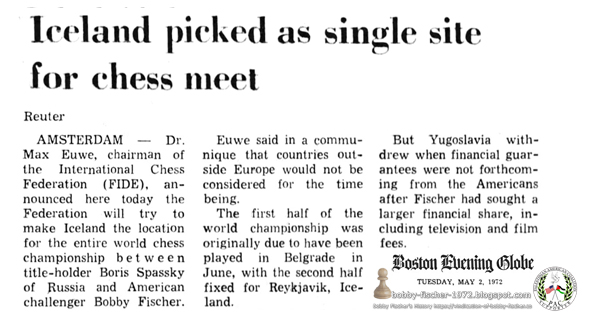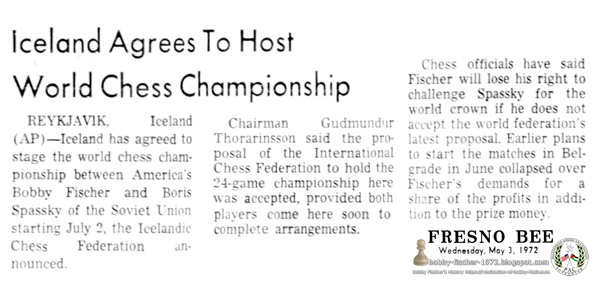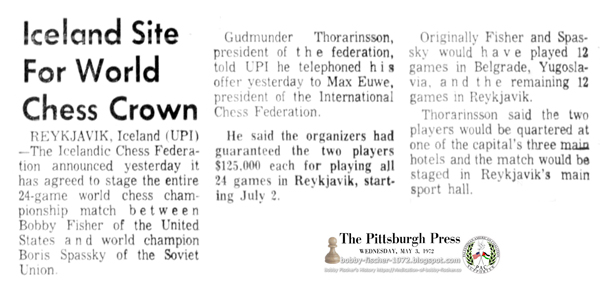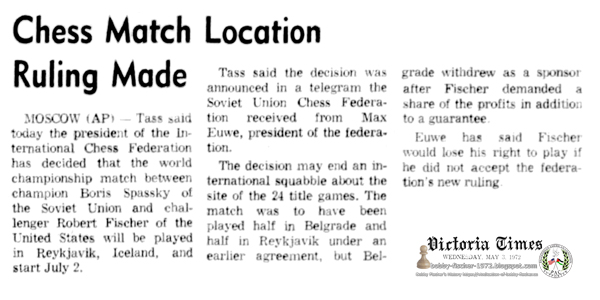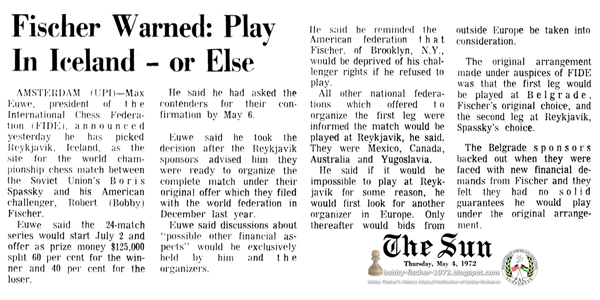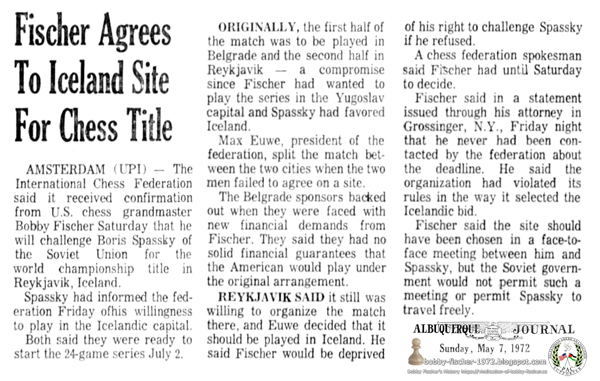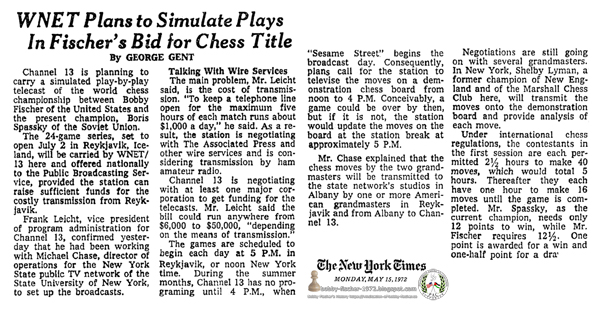The Evening Sun Baltimore, Maryland Monday, May 01, 1972 - Page 3
Chess Bout Gets Another Offer
Sydney, Australia (Reuter) — A Sydney syndicate has submitted a $225,000 bid to stage the world chess championship here—the second offer to come out of Australia in three days.
The move came as officials of Victoria's Chess Association awaited a reply from the International Chess Federation to their $110,000 bid Friday to stage the championship in Melbourne.
A spokesman for the Sydney syndicate, Linden Prowse, said today he hoped to get title holder Boris Spassky of Russia and Bobby Fischer, United States challenger, to agree to play here in November.
The Sydney Morning Herald Sydney, New South Wales, Australia Tuesday, May 02, 1972 - Page 3
Chess Bid Made to Boost Australia
Mr. Linden Prowse flung his hands in the air and said: “Everybody wants to know why! Is there anything wrong with doing something for Australia?”
Mr. Prowse's “some-thing for Australia” is his unnamed syndicate's $225,000 bid for the right to stage in Sydney the world chess championship match between America's Bobby Fischer and Boris Spassky of the Soviet Union.
Yesterday Mr. Prowse, a 37-year-old businessman, said: “It's all our own money. We don't want the Government to help. It's up to Australian business people to get off their backsides and do this sort of thing for Australia.”
But he also conceded that if the syndicate went the right way about it “we might make a few pennies out of it.”
The profits would come largely from the sale of copyright to press representatives throughout the world.
“It is a contest between individuals—the old world of Tolstoy versus the new world,” he said.
“At least 800 million people are interested in playing and watching chess. This would be a great event for Australia.”
He said he had had “stacks of phone calls” yesterday from people offering financial support.
Mr. Prowse said that $200,000 of the $225,000 would go towards prize money, with the remaining $25,000 for expenses.
He was confident the offer would be accepted by Spassky and Fischer.
For Fischer it had the advantage of being a “neutral” country, and for Spassky, all 24 games being held in one country.
Mr. Prowse, who described himself as a poor chess player—“but you don't have to be a chef to enjoy good food”—said that he would not make any further offer if the present one was rejected.
“We are not running in an auction.” Mr. Prowse was one of the founders of LUV Pet-foods, which was acquired by US interests last year.
The organizing secretary of the Australian Chess Federation, Mr. G. Koshnitsky, said last night he had sent Mr. Prowse's offer to the International Chess Federation in Amsterdam.
The Australian offer had to be considered with several others.
“However, we have a few advantages,” he said.
Mr. Koshnitsky said he expected a decision “in the next few days.”
Courier-Post Camden, New Jersey Tuesday, May 02, 1972 - Page 17
World Chess Match Site Selection Ready
Amsterdam (UPI) — Max Euwe, president of the International Chess Federation, said Monday he would make a final decision on the world championship match of Bobby Fischer of the United States and Boris Spassky of the Soviet Union within the next few days.
“I have just returned from a chess-promoting world trip. Tuesday, I will check all information with my secretariat,” he said. I have already made up my mind about a line of action. I will make a final decision within the next few days. The affair has been going on already too long.”
At a meeting in Amsterdam, March 20, representatives of the two players and of the Soviet, American, Yugoslav and Icelandic federations agreed on a procedure for the 24-match series.
The first leg was scheduled to start June 22 in Belgrade and the second leg would be played in Reykjavik.
The two cities offer prize money of $138,000 of which 62.5 per cent would go to the winner and 37.5 per cent to the loser.
The Belgrade sponsors backed out after Fischer wanted more money. The international federation received various offers to take over, including one from Reykjavik to organize the complete match.
The Soviet federation has demanded that Euwe should accept the Reykjavik offer and force Fischer to do so too under the threat he would be deprived of his challenging rights.
An Australian syndicate made a $226,000 bid Monday for the world chess championship between Spassky and Fischer to be played in Sydney. The bid was announced by Linden Prowse, a businessman who declined to name the members of the syndicate. They cabled the offer to Amsterdam.
Journal and Courier Lafayette, Indiana Tuesday, May 02, 1972 - Page 34
Chess Negotiations
Amsterdam, Netherlands (AP) — Negotiations on the site and date of the world chess championship match between title holder Boris Spassky of the Soviet Union and his U.S. challenger Bobby Fischer will be handled from now on by World Chess Federation President Dr. Max Euwe.
“Now that Fischer has made the Amsterdam agreement and the staging of the match in Belgrade, Yugoslavia, impossible, the financial aspects of the title match will be handled by the FIDE,” a spokesman said. FIDE is the federation.
Under the Amsterdam agreement, it was decided to play half of the 24 title games in Belgrade and the other half in Reykjavik, Iceland. Belgrade backed out, however, after Fischer demanded a share in the profits above the $138,000 offered as prize money. The spokesman said FIDE will now try to have the entire match staged in Reykjavik, beginning June 22.
The Boston Globe Boston, Massachusetts Tuesday, May 02, 1972 - Page 5
Iceland picked as single site for chess meet
Reuter
Amsterdam — Dr. Max Euwe, chairman of the International Chess Federation (FIDE), announced here today the Federation will try to make Iceland the location for the entire world chess championship between title-holder Boris Spassky of Russia and American challenger Bobby Fischer.
Euwe said in a communique that countries outside Europe would not be considered for the time being.
The first half of the world championship was originally due to have been played in Belgrade in June, with the second half fixed for Reykjavik, Iceland.
But Yugoslavia withdrew when financial guarantees were not forthcoming from the Americans after Fischer had sought a larger financial share, including television and film fees.
Dayton Daily News Dayton, Ohio Wednesday, May 03, 1972 - Page 39
Your Move Chess Club Tells Bobby
Amsterdam, Netherlands (AP) — The world chess championship was handed today to Iceland's capital, Reykjavik, a spokesman of the International Chess Federation — FIDE — said.
The championship is scheduled to start July 2.
The decision to go for Reykjavik — which had offered to host the games between title holder Boris Spassky of Russia and challenger Bobby Fischer of the United States — was taken by FIDE's president, Dr. Max Euwe, the spokesman said.
FIDE gave Fischer until Saturday morning to declare his willingness to play on the conditions set by Reykjavik. ([No formal contract presented in writing? Just forced into acceptance of whatever terms the Soviet Union may hide between the lines and throw at the two opponents.)]
THESE are a prize fund of $125,000, with the winner taking $78,125 and the loser the rest.
If Fischer, or his chess federation, fails to give a positive reply on the stated deadline, the U.S. grandmaster will lose his right to challenge Spassky, the spokesman said. The right to challenge will then go to Russian grandmaster Tigran Petrosian, whom Fischer defeated in the world championship semifinals. ([By this statement, those “old hands” at work behind the scenes, pulling strings to replace Fischer, true to Ken Smith's predictions, revealing the extent of Soviet coercion and control over FIDE.)]
The Fresno Bee The Republican Fresno, California Wednesday, May 03, 1972 - Page 18
Iceland Agrees To Host World Chess Championship
Reykjavik, Iceland (AP) —Iceland has agreed to stage the world chess championship between America's Bobby Fischer and Boris Spassky of the Soviet Union starting July 2, the Icelandic Chess Federation announced.
Chairman Gudmundur Thorarinsson said the proposal of the International Chess Federation to hold the 24-game championship here was accepted, provided both players come here soon to complete arrangements.
Chess officials have said Fischer will lose his right to challenge Spassky for the world crown if he does not accept the world federation's latest proposal. Earlier plans to start the matches in Belgrade in June collapsed over Fischer's demands for a share of the profits in addition to the prize money.
The Miami News Miami, Florida Wednesday, May 03, 1972 - Page 2
Iceland Gets Chess Tournament
Reykjavik, Iceland — The long-delayed World Chess Championship between the Soviet title-holder Boris Spassky and American Bobby Fischer will begin here on July 2, it was announced here last night.
Gudmundur Thorarinsson, president of Iceland's Chess Federation, said he had accepted an offer from the International Chess Federation president, Dr. Max Euwe, to hold the entire contest in Reykjavik.
The International Federation (FIDE) would now officially offer Spassky and Fischer the chance to meet here and if either refused he would be disqualified.
The Pittsburgh Press Pittsburgh, Pennsylvania Wednesday, May 03, 1972 - Page 9
Iceland Site For World Chess Crown
Reykjavik, Iceland (UPI) — The Icelandic Chess Federation announced yesterday it has agreed to stage the entire 24-game world chess championship match between Bobby Fisher of the United States and world champion Boris Spassky of the Soviet Union.
Gudmunder Thorarinsson, president of the federation, told UPI he telephoned his offer yesterday to Max Euwe, president of the International Chess Federation.
He said the organizers had guaranteed the two players $125,000 each for playing all 24 games in Reykjavik, starting July 2.
Originally Fisher and Spassky would have played 12 games in Belgrade, Yugoslavia, and the remaining 12 games in Reykjavik.
Thorarinsson said the two players would be quartered at one of the capital's three main hotels and the match would be staged in Reykjavik's main sport hall.
Times Colonist Victoria, British Columbia, Canada Wednesday, May 03, 1972 - Page 22
Chess Match Location Ruling Made
Moscow (AP) — Tass said today the president of the International Chess Federation has decided that the world championship match between champion Boris Spassky of the Soviet Union and challenger Robert Fischer of the United States will be played in Reykjavik, Iceland, and start July 2.
Tass said the decision was announced in a telegram the Soviet Union Chess Federation received from Max Euwe, president of the federation.
The decision may end an international squabble about the site of the 24 title games. The match was to have been played half in Belgrade and half in Reykjavik under an earlier agreement, but Belgrade withdrew as a sponsor after Fischer demanded a share of the profits in addition to a guarantee.
Euwe has said Fischer would lose his right to play if he did not accept the federation's new ruling. ([A “new ruling” which was not provided to Fischer in written form for Fischer to make an informed, consensual agreement based upon facts, as in any “valid contract”. Rather, Fischer was given an ultimatum: 1) Agree to a contract he knows not what it entails overtly, or “between the lines”. Such a demand would never be issed by any legitimate organization or institution! or 2) forfeit the match. Agree to a contract you've neither seen nor read? Such is an impossible request, a “Catch 22” thrust upon Fischer by the Soviets. Ken Smith had predicted scheming “old hands” were at work to “replace Fischer” so no matter what way Fischer chose after this scheme, it was a lose-lose situation.)]
The Province Vancouver, British Columbia, Canada Wednesday, May 03, 1972 - Page 34
Iceland May Host Entire Chess Match
(Reuter) Amsterdam — Dr. Max Euwe, chairman of the International Chess Federation announced Tuesday the federation will try to make Iceland the venue for the entire world chess championship between titleholder Boris Spassky of Russia and American challenger Bobby Fischer.
Euwe said in a statement countries outside Europe will not be considered for the time being. Montreal earlier had bid for half of the championship. The first half was originally due to have been played in Belgrade in June, with the second half fixed for Reykjavik, Iceland.
But Yugoslavia withdrew when ([as pointed out by Edmondson of the US Chess Federation, illegally demanded guarantees for which the contract contained no provision]) financial guarantees were not forthcoming ([of course not, because the demand was illegal)] from the Americans after Fischer had sought a larger financial share, including television and film fees.
Belgrade and Reykjavik were a compromise after the two players had failed to agree on a single venue.
Euwe said that FIDE continues to aim at a day between June 22 and 25 as starting date of the match. He said he will handle financial aspects. This means that these matters will no longer be negotiated by the players, federations and other organizers. ([And, he will be permitted to do so, as long as his “decisions” meet with Soviet satisfaction.)]
The San Francisco Examiner San Francisco, California Thursday, May 04, 1972 - Page 2
Russ OK Iceland Chess
Moscow — (AP) — The Soviet Chess Federation agreed today that Reykjavik, Iceland, should be the site of the world championship chess match between title holder Boris Spassky of Russia and Bobby Fischer of the United States.
The Soviet Federation approved the Reykjavik site in a telegram to the International Chess Federation, according to the official news agency, Tass.
It also agreed that the match should begin July 2, as proposed by International Federation President Max Euwe of Amsterdam.
Euwe gave Spassky and Fischer until 9 a.m. Saturday to agree to the time and place. Fischer has not replied.
Euwe has said Fischer would lose the right to play for the title if he failed to accept.
The Sydney Morning Herald Sydney, New South Wales, Australia Thursday, May 04, 1972 - Page 8
Iceland Named For Chess Titles on July 2
Reykjavik, (Iceland), Wednesday. — The long-delayed world chess championship between the Soviet title-holder, Boris Spassky and the American player, Bobby Fischer, will begin in Reykjavik on July 2, if the two contenders agree.
Mr Gudmundur Thorarinsson, president of Iceland's Chess Federation, announced tonight that he had accepted an offer today from the International Chess Federation president, Dr Max Euwe, to hold the entire 24-game contest in Reykjavik.
If either player refused, he would be disqualified, he said.
The contest was originally to have been held in two stages — the first 12 games in Belgrade in June and 12 more in Reykjavik.
But Yugoslavia withdrew after Fischer had sought a larger financial share, including television and film fees. Since the problems over a location arose, offers to stage the contest have been made by Australia, Holland, Puerto Rico and Mexico.
Derryn Hinch, “Herald” correspondent, reports from New York:
The United States Chess Federation has come out in favor of holding the championship in Sydney.
The federation's executive director, Colonel Edmund Edmondson, said in New York yesterday that Sydney was “far and away the best offer” to stage the competition.
He was referring to a Sydney syndicate's offer of $225,000 to stage the championship in Australia.
Col. Edmondson said Dr. Euwe “in his wisdom will no doubt have to reconsider the announcement he has just made [offering the whole match to Iceland] in view of the offer earlier today from Sydney.”
Auckland, Wednesday. — The Sydney syndicate seeking to stage a world chess championship in Australia considers its offer still open. The syndicate head, Mr. Linden Prowse, said this tonight after hearing details of a report that Reykjavik, Iceland, was to be the location.
The San Bernardino County Sun San Bernardino, California Thursday, May 04, 1972 - Page 31
Fischer Warned Play In Iceland or Else
Amsterdam (UPI)—Max Euwe, president of the international Chess Federation (FIDE), announced yesterday he has picked Reykjavik, Iceland, as the site for the world championship chess match between the Soviet Union's Boris Spassky and his American challenger, Robert (Bobby) Fischer.
Euwe said the 24-match series would start July 2 and offer as prize money $125,000 split 60 per cent for the winner and 46 per cent for the loser.
He said he had asked the contenders for their confirmation by May 6.
Euwe said he took the decision after the Reykjavik sponsors advised him they were ready to organize the complete match under their original offer which they filed with the world federation in December last year.
Euwe said discussions about “possible other financial aspects” would he exclusively held by him and the organizers.
He said he reminded the American federation that Fischer, of Brooklyn, N.Y., would be deprived of his challenger rights if he refused to play.
All other national federations which offered to organize the first leg were informed the match would he played at Reykjavik, he said. They were Mexico, Canada, Australia and Yugoslavia.
He said if it would be impossible to play at Reykjavik for some reason, he would first look for another organizer in Europe. Only thereafter would bids from outside Europe be taken into consideration.
The original arrangement made under auspices of FIDE was that the first leg would he played at Belgrade, Fischer's original choice, and the second leg at Reykjavik, Spassky's choice.
The Belgrade sponsors backed out when they were faced with new financial demands from Fischer and they felt they had no solid guarantees he would play under the original arrangement. ([Euwe knew as well as Edmondson, the Belgrade demand for a 35k “guarantee” was not in the contract, therefore illegal. Euwe knew Fischer did not twist the arms of Belgrade organizers to withdraw, anymore than Reykjavik withdrew. While away on his tour, Euwe was enthusiastic with the possibility of Australia acting as tournament host, perhaps… Euwe praised the offer by Mexico for offering the “highest purse” which Australia would later beat, all this and more, while away on tour. Euwe returns to Europe, to find Soviet delegates breathing down his back. Euwe does an about face, calls off his recent open bidding invitation, opting to do things the “Soviet Way”. News reports now become sullen and threatening. One might perceive Euwe's changeability as “erratic”.)]
New York Times, New York, New York, Thursday, May 04, 1972 - Page 16
Reykjavik Awarded Title Chess Series
It was Bobby Fischer's move yesterday in the preliminaries for the world chess championship—and the American challenger remained incommunicado on the latest proposal to hold his matches with Boris Spassky of the Soviet Union in Reykjavik, Iceland, starting July 2.
A spokesman in Amsterdam, the Netherlands, for the International Chess Federation said Fischer had until Saturday morning to accept the terms proposed by the Icelandic Chess Federation for the staging of the entire 24-game series: the winner to get $78,125 and the loser the balance of a prize purse of $125,000.
The spokesman said Fischer would lose his right to challenge Spassky and would be replaced as challenger by Tigran Petrosian, whom Fischer had eliminated in the semifinals, if the American contender failed to accept this ultimatum.
Fischer was said to be still in the Catskills preparing for the match. His lawyer and spokesman here, Paul G. Marshall, was not immediately available.
Soviet hiding the match and pushing the reward ratio down to the lowest bar possible.
`The Salt Lake Tribune Salt Lake City, Utah Thursday, May 04, 1972 - Page 10
Chess Match Slated for Iceland?
Reuters News Agency, The Hague — The Soviet and United States chess federations have to confirm by Saturday that world champion Boris Spassky and American Bobby Fischer will meet in Reykjavik, Iceland, on July 2. Dr. Max Euwe, chairman of the International Chess Federation said here Wednesday.
Euwe said FIDE had asked the federations to reply by May 6 at the latest that their players would be available.
The much-postponed meeting of Spassky and Fischer — which has been delayed by disputes over where the contest should be held and financial arrangements — was finally fixed last night.
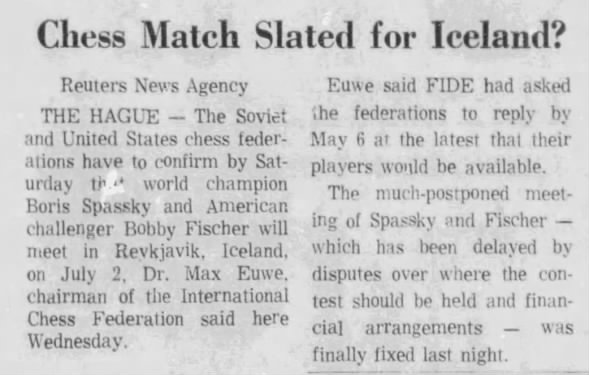 Chess Match Slated for Iceland? Thu, May 4, 1972 – 10 · The Salt Lake Tribune (Salt Lake City, Utah) · Newspapers.com
Chess Match Slated for Iceland? Thu, May 4, 1972 – 10 · The Salt Lake Tribune (Salt Lake City, Utah) · Newspapers.com
The Sydney Morning Herald Sydney, New South Wales, Australia Friday, May 05, 1972 - Page 3
Bid For Chess Still On
The head of the Sydney syndicate seeking to stage the world chess championships is ready to meet the American contender, Bobby Fischer, to press Sydney's claims.
Mr. Linden Prowse said this yesterday in an urgent telegram to the executive director of the US Chess Federation, Colonel Edmund Edmondson.
In Auckland on business, Mr. Prowse said his telegram requested contact with Fischer for talks on the championship.
It was announced on Wednesday that the tournament between Fischer and the Soviet title-holder, Boris Spassky, would begin in Reykjavik, Iceland, on July 2.
Mr Prowse said yesterday he did not regard this decision as final.
“There are quite a number of obstacles to be overcome before Reykjavik can clearly be said to be the venue,” he said.
“We will maintain our offer and press Sydney's claims as hard as possible.”
New York Times, New York, New York, Saturday, May 06, 1972 - Page 33
Fischer Accepts Match In Iceland
Agrees to Oppose Spassky for World Chess Title by Murray Illson
Bobby Fischer, the American challenger for the world chess championship, agreed yesterday to play the champion, Boris Spassky of the Soviet Union, in Reykjavik, Iceland, “or anywhere else in the free world.”
The move by the 29-year-old American grandmaster, made at Grossinger's, in the Catskills, where he has been training, apparently ended a four-month controversy over the site for the match and the division of the prize money.
A spokesman in Amsterdam, the Netherlands for the International Chess Federation, said on Wednesday that Fischer had until this morning to accept the terms proposed by Icelandic Chess Federation for staging the 24-game series in Reykjavik starting July 2. Under the Icelandic bid, the winner would receive $78,125, and the loser the balance of a prize purse of $125,000.
Paul G. Marshall, Fischer's lawyer, said his client had agreed to the match with Spassky “in spite of the continued attempts by the Russian Government to defend a title by chicanery instead of skill.”
Fischer, according to the statement, held that the site of the match should have been chosen in a face-to-face meeting between himself and Spassky but that the Soviet Government would not permit a meeting or allow Spassky to travel freely.
Accusing the International Chess Federation of being “biased,” the statement charged that Fischer's only knowledge of the Icelandic bid came to him from newspaper reports and that he had never been reached personally by the federation.
“While Mr. Fischer expressed admiration for both the people and the country of Iceland,” the statement said, “he noted that the lack of technical facilities there made televised coverage very difficult and severely hampered films or tape recordings of the event.”
Fischer's “chief aim was to see that his friends in the Americas could for the first time see their representative play for the world championship,” the statement said.
The Orlando Sentinel Orlando, Florida Saturday, May 06, 1972 - Page 5
Fischer Accepts Match In Iceland
Grossingers, N.Y. (Reuter) Chess master Bobby Fischer agreed Friday to play world chess champion Boris Spassky of the Soviet Union for the title in Reykjavik, Iceland, Fischer's representative said.
Paul Marshall, Fischer's representative said Fischer had agreed to the International Chess Federation's proposal of Iceland as the site of the world chess championships because “Bobby feels that even under adverse and uncertain conditions designed to make it difficult for him to play, he must play and win as a matter of national and personal pride.”
FISCHER WON the right to challenge Russia's Spassky for the title, which is contested every three years, by defeating other potential challengers, including former world champion Tigran Petrosyan of the Soviet Union.
Spassky won the world title from Petrosyan in Moscow in 1969.
Fischer's acceptance of Iceland appears to have ended a long wrangle over the championship site that threatened to jeopardize this year's championship. The international association was reported at one stage to be considering cancellation of the title match because of Fischer's reluctance to agree to a site.
MARSHALL SAID Fischer found making the decision to go to Iceland was “one heck of a struggle … it was really terrible.”
Fischer's spokesman added the choice of Iceland “was made solely by the Soviet government without reference to either of the players.”
“The method by which the choice was made is clearly against FIDE (International Chess Federation rules and brings into question the integrity and intent of FIDE,” he said.
FIDE had originally stated it had refused to hold any part of the match in the Western hemisphere, the spokesman said, “evidencing not only a callous disregard of their own rules and display of authority, but a prejudice which has marked chess championships ever since the Soviet Union obtained the monopoly.”
Arizona Daily Star Tucson, Arizona Saturday, May 06, 1972 - Page 2
Fischer Accepts Chess Site
Issues Complaint Over Treatment
Grossinger, N.Y. (AP) — American chess grand master Bobby Fischer agreed Friday to play Boris Spassky of Russia “in Iceland or anywhere else in the free world” under conditions set by the International Chess Federation (FIDE) for their world championship match.
It was Fischer's first public comment since the FIDE announced April 28 that it had awarded the 24-game title match to Reykjavik, the capital of Iceland.
In a statement issued by a spokesman here, Fischer complained that FIDE officials had “rebuffed” his efforts to learn details of the Icelandic bid. But the spokesman added:
“In spite of continued attempts by the Russian government to defend a world title by chicanery instead of skill: in spite of conditions unfavorable to Bobby set down by a biased organization and illegally enforced, and in spite of every handicap deliberately placed in Bobby's path, he will play Mr. Spassky in Iceland or anywhere else in the free world under conditions of the Icelandic bid, as yet unseen by him, and in accordance with such rules as have been laid down by FIDE, as yet not clarified to him.”
The spokesman, Joel Pomerantz, said Fischer had notified the FIDE by telegram of his decision to accept terms of the match, in which Fischer is challenger for the title.
Earlier plans to stage the matches in Belgrade in June collapsed when Fischer demanded a share of the profits in addition to the prize.
Under conditions set in Reykjavik, the players will share a $125,000 purse, the winner getting $78,125, and the loser, $46,875. The matches were scheduled to begin July 2.
Kenosha News Kenosha, Wisconsin Saturday, May 06, 1972 - Page 17
Quinteros Aides Fischer Training
Among its guests, Grossinger's has a “sparring partner” to help Bobby Fischer train for his forthcoming world-championship chess match against Russia's Boris Spassky. The sparring partner is former Argentinean champion Miguel Quinteros. At 24, he is considered one of the top players in South America. He speaks very little English, but Fischer has a good working knowledge of Spanish.
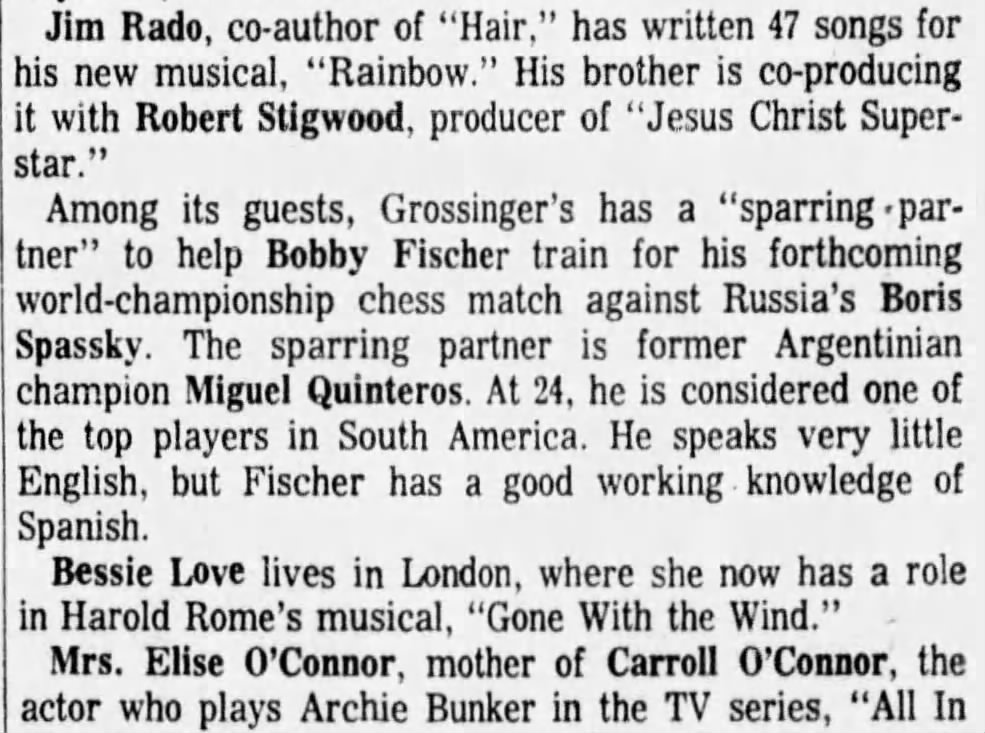 Quinteros Aides Fischer Training 06 May 1972, Sat Kenosha News (Kenosha, Wisconsin) Newspapers.com
Quinteros Aides Fischer Training 06 May 1972, Sat Kenosha News (Kenosha, Wisconsin) Newspapers.com
Albuquerque Journal Albuquerque, New Mexico Sunday, May 07, 1972 - Page 85
Fischer Agrees To Iceland Site For Chess Title
Amsterdam (UPI) — The International Chess Federation said it received confirmation from U.S. chess grandmaster Bobby Fischer Saturday that he will challenge Boris Spassky of the Soviet Union for the world championship title in Reykjavik, Iceland.
Spassky had informed the federation Friday of his willingness to play in the Icelandic capital.
Both said they were ready to start the 24-game series July 2.
ORIGINALLY, the first half of the match was to be played in Belgrade and the second half in Reykjavik — a compromise since Fischer had wanted to play the series in the Yugoslav capital and Spassky had favored Iceland.
Max Euwe, president of the federation, split the match between the two cities when the two men failed to agree on a site.
The Belgrade sponsors backed out when they were faced with new financial demands from Fischer. They said they had no solid financial guarantees that the American would play under the original arrangement.
REYKJAVIK SAID it still was willing to organize the match there, and Euwe decided that it should be played in Iceland. He said Fischer would be deprived of his right to challenge Spassky if he refused.
A chess federation spokesman said Fischer had until Saturday to decide.
Fischer said in a statement issued through his attorney in Grossinger, N.Y., Friday night that he never had been contacted by the federation about the deadline. He said the organization had violated its rules in the way it selected the Icelandic bid.
Fischer said the site should have been chosen in a face-to-face meeting between him and Spassky, but the Soviet government would not permit such a meeting or permit Spassky to travel freely.
Pacific Daily News Agana Heights, Guam Sunday, May 07, 1972 - Page 30
Fischer Agrees To Meet Russian Chess Champion
Grossinger, New York (UPI)—American chess challenger Bobby Fischer of New York City said today he will meet Russian champion Boris Spassky for a 24-game world championship series in Reykjavik, Iceland, or anywhere else in the Free World.
Fischer, in a statement issued through his New York attorney, Paul Marshall, said he will meet Spassky anywhere in the Free World under the conditions of the Icelandic bid, even though he has never seen the proposal.
Originally, 12 games were to be played in Reykjavik and 12 in Belgrade, but the Belgrade sponsors withdrew last month following new financial demands by Fischer.
A spokesman for the International Chess Federation (FIDE) said the Soviet Chess Federation agreed to Reykjavik as a site for a match starting July 2. A FIDE spokesman said Fischer had until tomorrow morning to reply.
Fischer's statement said he had never been personally contacted by FIDE about the deadline and said the organization violated its rules in the way it selected the Icelandic bid.
The Sydney Morning Herald Sydney, New South Wales, Australia Sunday, May 07, 1972 - Page 6
World Chess to Be Played in Iceland
New York, Saturday (AAP-Reuter): Bobby Fischer of America, agreed yesterday to play world chess champion Boris Spassky of the Soviet Union for the title in Reykjavik, Iceland.
Fischer's representative, Mr. Paul Marshall, said:
“In spite of continued attempts on the part of the Russian Government to avoid defending a title by chicanery instead of defending it with skill, in spite of conditions unfavorable to Bobby set forth by a biased organization (the International Chess Federation) and improperly enforced, and in spite of every handicap deliberately placed in Bobby's path, he has agreed to play Boris Spassky in Iceland or anywhere in the free world.”
He said Fischer had agreed to the federation's proposal of Iceland for the series because Bobby feels that even under adverse and uncertain conditions designed to make it difficult for him to play, he must play and win as a matter of national and personal pride.”
Fischer won the right to challenge Spassky for the title, which is contested every three years, by defeating other potential challengers, including former world champion Tigran Petrosian of the Soviet Union.
Spassky won the title from Petrosyan in Moscow in 1969.
“The method by which the choice was made is clearly against FIDE (International Chess Federation) rules and brings into question the integrity and intent of FIDE,” he said.
The U.S. Chess federation earlier backed Sydney as the site for the match.
The federation president, Colonel Ed Edmondson, said the federation thought Sydney's $225,000 offer was “far and away the best bid.”
The International Chess Federation chairman, Dr. Max Euwe, had announced that the had selected Reykjavik, Iceland, as host city for the 24-game series and gave Fischer and Spassky until today to accept the decision.
Colonel Edmondson was critical of Dr. Euwe and said the whole thing was “a mess.”
He said he was not down-grading Iceland — “They have a good playing hall and they've made a generous offer.”
“It amounts to about half a dollar for every man, woman and child in the country.”
But it still did not match the Sydney offer.
The Atlanta Constitution Atlanta, Georgia Sunday, May 07, 1972 - Page 8
Fischer Approves Of Iceland Match from Wire Reports
Grossinger, N.Y. — American chess grandmaster Bobby Fischer has agreed to Iceland as the site of his 24-game world championship match against Boris Spassky of Russia.
A spokesman for Fischer said that he would play “under conditions of the Icelandic bid, as yet unseen by him, and in accordance with such rules as have been laid down by FIDE (International Chess Federation) as yet not clarified to him.”
Under conditions set in Reykjavik, the capital of Iceland, play will begin July 2 and the contestants will share a $125,000 purse, the winner getting $78,125 and the loser, $46,875.
Earlier plans to stage the match in Belgrade, Yugoslavia, in June collapsed after Fischer demanded a share of the profits in addition to the prize. Reykjavik was awarded the 24-game title match April 28.
Fischer's spokesman, Joel Pomerantz, said Fischer had hoped to play the match either in North or South America so that “his friends in America could for the first time, see their representative play for the world championship.
“Bobby feels that even under these adverse conditions, he can play and win as a matter of international and personal pride,” Pomerantz said.
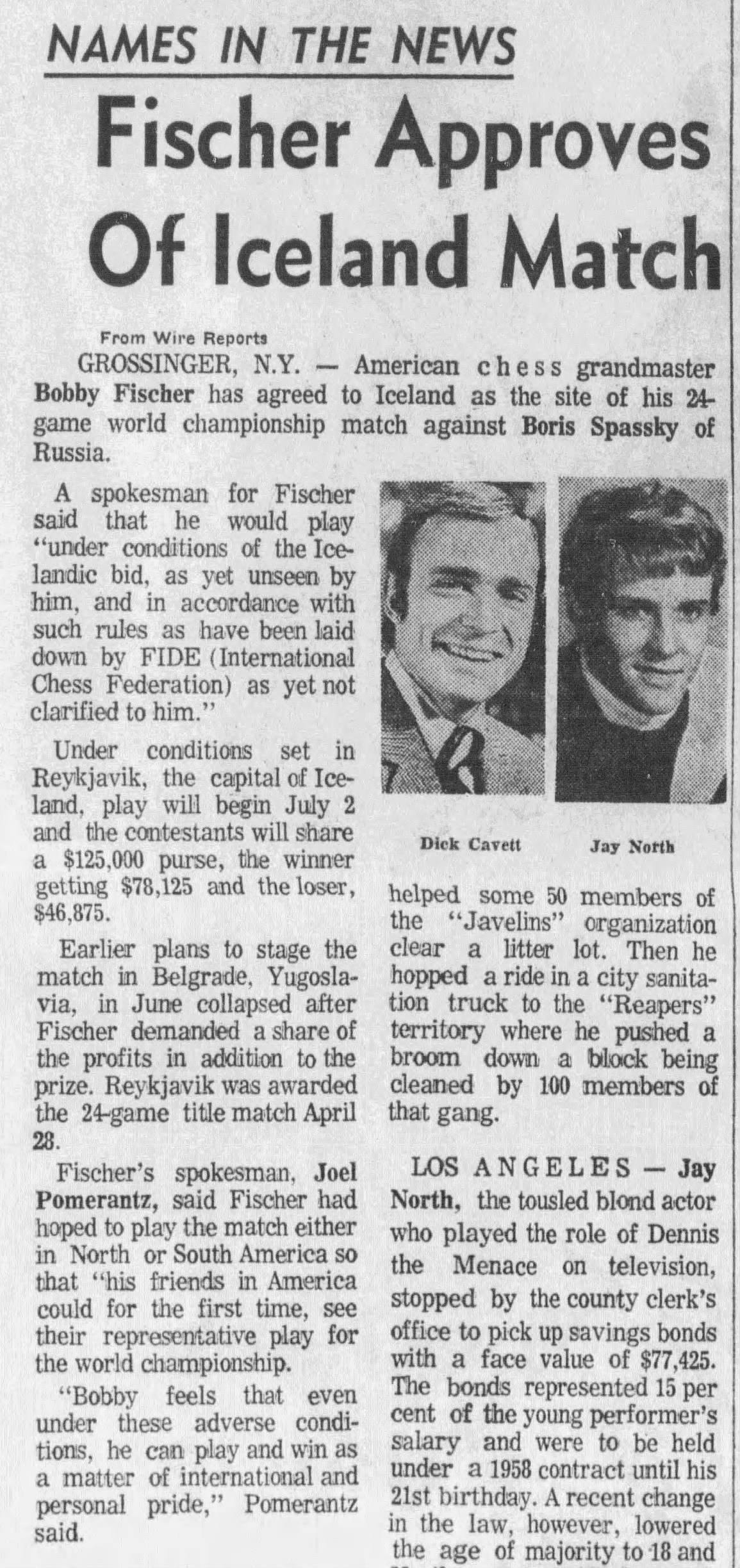 Fischer Approves of Iceland Match 07 May 1972, Sun The Atlanta Constitution (Atlanta, Georgia) Newspapers.com
Fischer Approves of Iceland Match 07 May 1972, Sun The Atlanta Constitution (Atlanta, Georgia) Newspapers.com
Oakland Tribune Oakland, California Thursday, May 11, 1972 - Page 18
Ideological Chess Duel?
The World Chess Championship between the young American grandmaster Bobby Fischer and the current champion Boris Spassky of Russia is taking on the aspects of an ideological duel between the two super powers.
After six months' search, the pair finally agreed on Reykjavik, Iceland as the site of the 24-game match. Next thing we'll know is that they can't decide on the shape of the chess table.
While all of this has been going on, the participants and some of their fellow countrymen have engaged in the sort of name calling and propaganda long familiar to U.S.-Russian forays.
The Soviet Union has charged Fischer with “connivance” and “endless whims” and said he was only interested in capitalistic gain. Fischer said he would not play the match unless it were held in the free world.
How much of these exchanges before the July 2 match is psychology in the form of one-up-manship is not easily determined, but the battle of wits and steeled nerves is expected to last through all of the lengthy games.
Fischer has been called a lot of things including erratic, egocentric, a genius, a wizard, temperamental, sullen, unpredictable, patient, a prima donna, highly controversial and “a machine.” But one this is certain, he represents the best chance of any challenger in the last 10 years to wrest the title away from the Russians.
The chess match between the two probably will be as bitter as it is brilliant as they pursue the most coveted title of best player in the world.
As one observer put it, chess “is absolutely living. Chess is a game that represents all the successes and failures of life.”
Perhaps that's why the Russians and the Americans place such value on winning the championship and why the match has taken on the added intrigue of exploiting ideological differences.
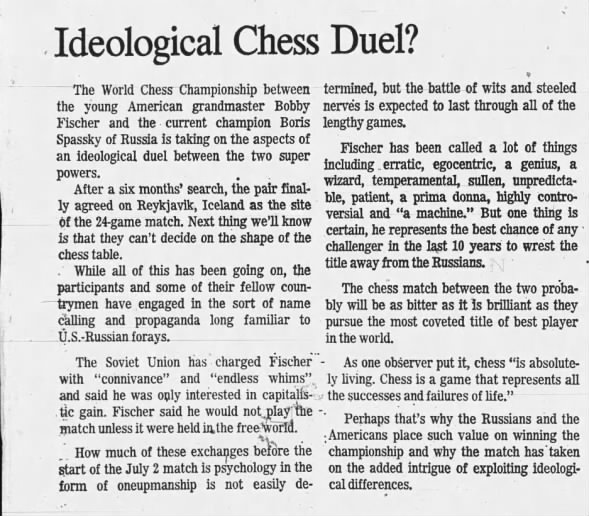 Ideological Chess Duel? Thu, May 11, 1972 – 18 · Oakland Tribune (Oakland, California) · Newspapers.com
Ideological Chess Duel? Thu, May 11, 1972 – 18 · Oakland Tribune (Oakland, California) · Newspapers.com
The Emporia Gazette Emporia, Kansas Thursday, May 11, 1972 - Page 2
Garner Ted Exiled
Reprinted by permission from ©TIME, the Weekly News-magazine.
UNTIL LAST fall, lean, gray-templed Garner Ted Armstrong was the quintessential religious soft-sell artist. His program called THE WORLD TOMORROW was carried on some 400 radio and 99 TV stations. His slick, free monthly called THE PLAIN TRUTH went to 2,100,000 subscribers. To the millions of Americans who followed him, Garner Ted dispensed glib solutions to such problems …
AT FIRST, Herbert told W.C.G. members that Garner Ted was simply taking a long overdue leave of absence. Then, in February, the inner church membership — about 75,000 people — heard a letter from Pasadena so secret that their ministers were ordered to burn it after reading. It's message: Garner Ted was “in the bonds of Satan.” At the end of April, the senior Armstrong made a more public statement to the broader church membership — the “co-worker” category, which includes such sympathizers as Chess Grandmaster Bobby Fischer — explaining that Garner Ted had confessed to some kind of transgression against “God, against his church and his apostle, against the wife God gave me in my youth, against all my closest friends.” …
… In Herbert Armstrong's theology, unknown to much of his public, the British and the Americans are among the ten lost Hebrew tribes, destined to fight — and succumb to — a renewed Holy Roman Empire probably led by Germany. Then a Chinese-Russian alliance will fight the battle of Armageddon with the victor. At first, Herbert Armstrong predicted the beginning of the end for the late 1930s. The most recent Apocalypse was due on Jan. 7th, 1972.
In other departures from traditional Christianity, Armstrong and his faithful worship on Saturday, not Sunday; they observe kosher laws set forth in the Old Testament. They celebrate Passover but not Christmas or Easter. They deny the Trinity. But they believe steadfastly in the tithe — so much so that each member is expected to set aside three tithes, or tenths, of his gross income. One tenth is for church headquarters. One-tenth is for the member's travel expenses to church festivals. And, every few years, yet another tenth is required for “widows and orphans.” The church monitors the tithes by computer; one member caught cheating was sentenced to tithe double for the rest of his life.
 Garner Ted Exiled Thu, May 11, 1972 – Page 2 · The Emporia Gazette (Emporia, Kansas) · Newspapers.com
Garner Ted Exiled Thu, May 11, 1972 – Page 2 · The Emporia Gazette (Emporia, Kansas) · Newspapers.com
Interview with Bobby Fischer, the Ambassador Report (1977)
ZOLA: Did you ask Herbert was Ted's sin? And did he or did he not tell you?
FISCHER: No, I didn't want to insult him. Why, did you hear that we had a conversation.
ZOLA: Yes.
FISCHER: I met Herbert in the Hall of Administration, and he started to talk to me about his airplane and flying. And then he started going off on some wild tangents that may be significant. Then, it meant nothing to me. He was talking about stewardesses on the airplanes and how one of them was tempting Ted. I didn't know what he was talking about. I thought it was raving stuff, because I had no idea what he was talking about. I was wondering why he was telling me this. But he didn't admit anything.
See, I wasn't at that stage trying to find the loose brick. I wanted to believe. I feel that if Ted had done something 30 years ago, and nobody knew about it, it would be cruel to bring it up.
But this is different. This is a way of life, apparently from what I'm starting to hear. I'm sure if there's all that smoke, there's plenty of fire.
https://hwarmstrong.com/ar/ar-2/mobile/index.html#p=60
The Sydney Morning Herald Sydney, New South Wales, Australia Sunday, May 14, 1972 - Page 47
Australian Gambit
So Australia, after its belated flurry of big bids to stage the world chess championships, has missed its early chances. Only little Iceland will do, it appears, for the two giants from East and West to use as a battleground.
Interested in the discussion about fabulous sums available for televising the Spassky-Fischer contest, and what the interested viewer might see, I questioned Garry Koshnitzky, who is “The Sun-Herald” chess editor as well as organising secretary of the Australian Chess Federation. How, I asked, would a television audience react to a player gnawing his lips for half an hour while pondering a move?
Koshnitsky felt the best effect would come from an edited version of highlights inside the battle ground, with a commentator and a demonstration board outside. Otherwise filling in those long minutes might strain the most imaginative cricket broadcasters—and not even a seagull in sight.
Australia might put in a bid for the next title contest in 1975. Don't be surprised if the challenger is himself an Australian.
No, that is going too far at the moment, but one of the little heralded chess success stories is of Sydney-born International Grandmaster Walter Shawne Browne, living in New York but still an Australian citizen, who is ranked next to Bobby Fischer in the latest US ratings. Browne, at 23, and a professional full-time player, still has years of chess ahead of him—but then so has Fischer.
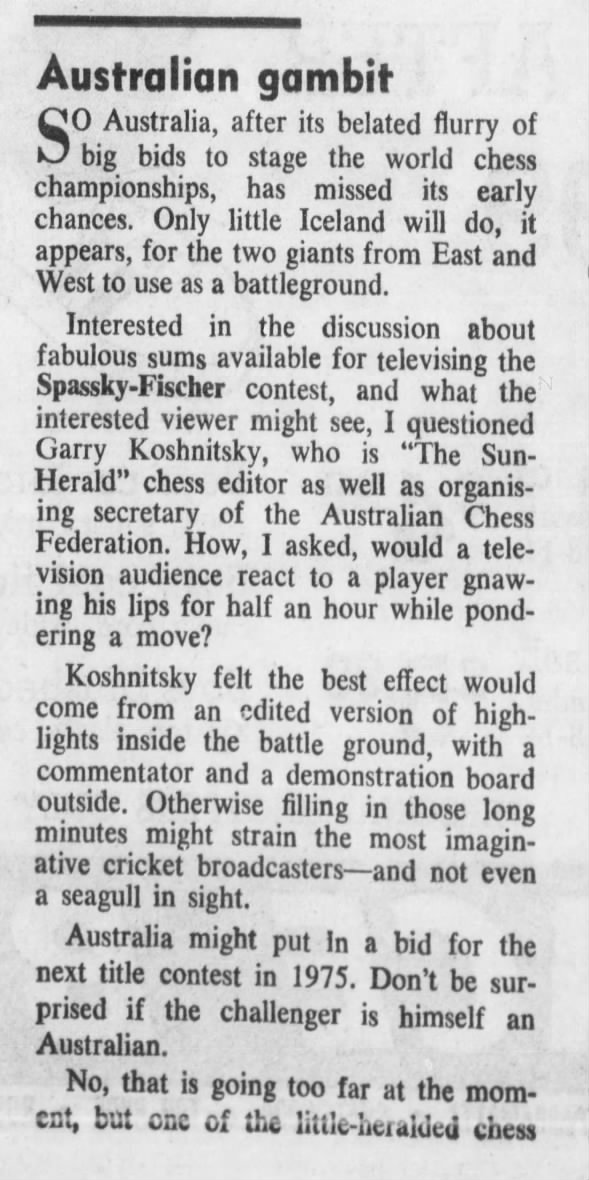 Australian Gambit Sun, May 14, 1972 – Page 47 · The Sydney Morning Herald (Sydney, New South Wales, Australia) · Newspapers.com
Australian Gambit Sun, May 14, 1972 – Page 47 · The Sydney Morning Herald (Sydney, New South Wales, Australia) · Newspapers.com
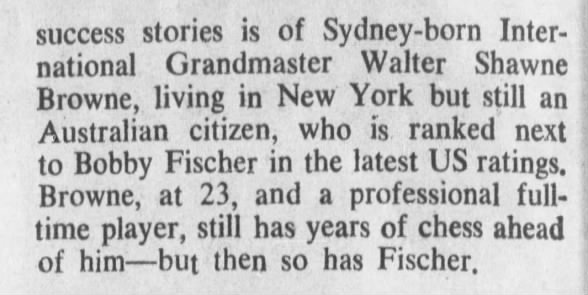 Australian Gambit Sun, May 14, 1972 – Page 47 · The Sydney Morning Herald (Sydney, New South Wales, Australia) · Newspapers.com
Australian Gambit Sun, May 14, 1972 – Page 47 · The Sydney Morning Herald (Sydney, New South Wales, Australia) · Newspapers.com
New York Times, New York, New York May 15, 1972 - Page 71
WNET Plans to Simulate Plays In Fischer's Bid for Chess Title by George Gent
Channel 13 is planning to carry a simulated play-by-play telecast of the world chess championship between Bobby Fischer of the United States and the present champion, Boris Spassky of the Soviet Union.
The 24-game series, set to open July 2 in Reykjavik, Iceland, will be carried by WNET/13 here and offered nationally to the Public Broadcasting Service, provided the station can raise sufficient funds for the costly transmission from Reykjavik.
Frank Leicht, vice president of program administration for Channel 13, confirmed yesterday that he had been working with Michael Chase, director of operations for the New York State public TV network of the State University of New York, to set up the broadcasts.
Talking With Wire Services
The main problem, Mr. Leicht said, is the cost of transmission. “To keep a telephone line open for the maximum five hours of each match runs about $1,000 a day,” he said. As a result, the station is negotiating with The Associated Press and other wire services and is considering transmission by amateur HAM radio.
Channel 13 is negotiating with at least one major corporation to get funding for the telecasts. Mr. Leicht said the bill could run anywhere from $6,000 to $50,000, “depending on the means of transmission.”
The games are scheduled to begin each day at 5 P.M. in Reykjavik, or noon New York time. During the summer months, Channel 13 has no programming until 4 P.M., when “Sesame Street” begins the broadcast day. Consequently, plans call for the station to televise the moves on a demonstration chess board from noon to 4 P.M. Conceivably, a game could be over by then, but if it is not, the station would update the moves on the board at the station break at approximately 5 P.M.
Mr. Chase explained that the chess moves by the two grandmasters will be transmitted to the state network's studios in Albany by one or more American grandmasters in Reykjavik and from Albany to Channel 13.
Negotiations are still going on with several grandmasters. In New York, Shelby Lyman, a former champion of New England and of the Marshall Chess Club here, will transmit the moves onto the demonstration board and provide analysis of each move.
Under international chess regulations, the contestants in the first session are each permitted 2½ hours to make 40 moves, which would total 5 hours. Thereafter they each have one hour to make 16 moves until the game is completed. Mr. Spassky, as the current champion, needs only 12 points to win, while Mr. Fischer requires 12½. One point is awarded for a win and one-half point for a draw.
The Windsor Star Windsor, Ontario, Canada Wednesday, May 17, 1972 - Page 16
Windsor Youth Ties First in Provincial Chess Meet by Al Strachan
…Bobby Fischer, the American master is his idol and, Ray thinks, the world's best chess player.
Ray tries to pattern his game after Fischer's using the same Ruy Lopez opening with a number of variations. He tries to be a positional player varying his moves to counter those of his opponents rather than sticking to a set plan of attack.
There is, however, one major difference between the games of Bobby Fischer and Ray Stone.
“He plays a lot better than I do,” Ray concedes.
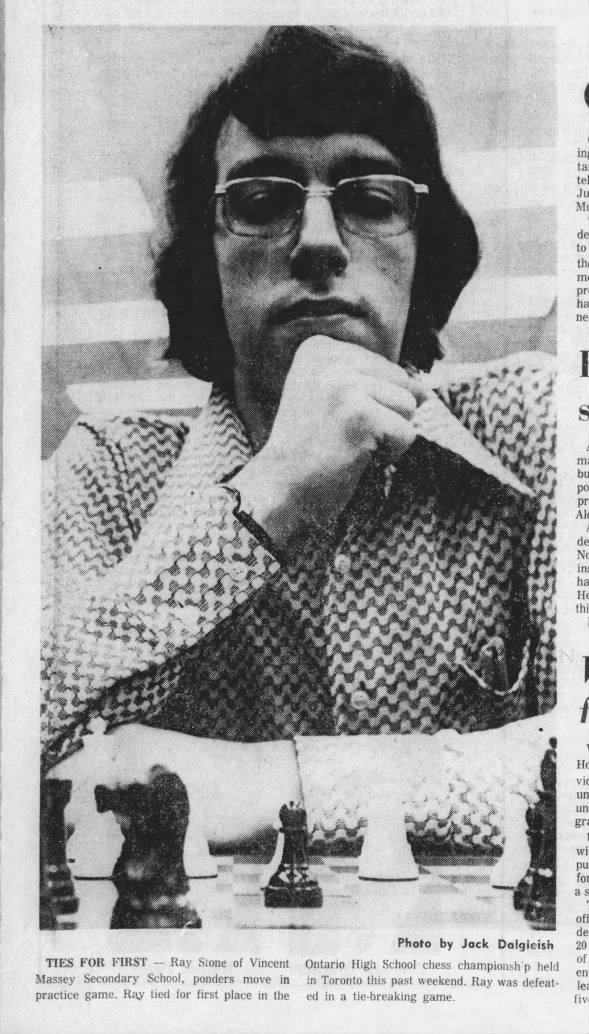 Windsor Youth Ties First in Provincial Chess Meet Wed, May 17, 1972 – 16 · The Windsor Star (Windsor, Ontario, Canada) · Newspapers.com
Windsor Youth Ties First in Provincial Chess Meet Wed, May 17, 1972 – 16 · The Windsor Star (Windsor, Ontario, Canada) · Newspapers.com
The term “temperamental” began usage, for instance, due to Bobby's religious observance of the same sabbath as Jews worship on. Antisemitic organizers felt they had the right to discriminate and force Bobby Fischer to play on sabbath. He refused to compromise. He dropped out although he was in the lead. He was devout in his faith, and unfairly ridiculed in the press by Antisemites.
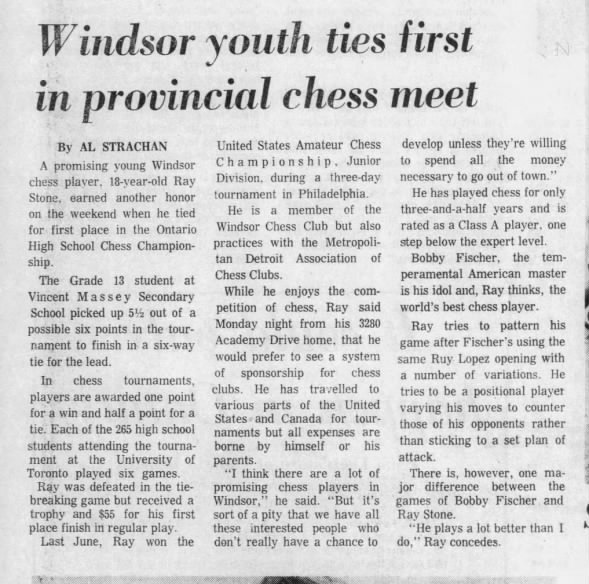 Windsor Youth Ties First in Provincial Chess Meet Wed, May 17, 1972 – 16 · The Windsor Star (Windsor, Ontario, Canada) · Newspapers.com
Windsor Youth Ties First in Provincial Chess Meet Wed, May 17, 1972 – 16 · The Windsor Star (Windsor, Ontario, Canada) · Newspapers.com
The Indianapolis Star Indianapolis, Indiana Saturday, May 20, 1972 - Page 65
The King and His Sixty-Four Squares by Sandra Shevey
Bobby Fischer Trains Fiercely for His Big Chance at the World Chess Championship—While ([Soviet Government and its network of influential sympathisers across western media]) Makes Waves That Could Upset it.
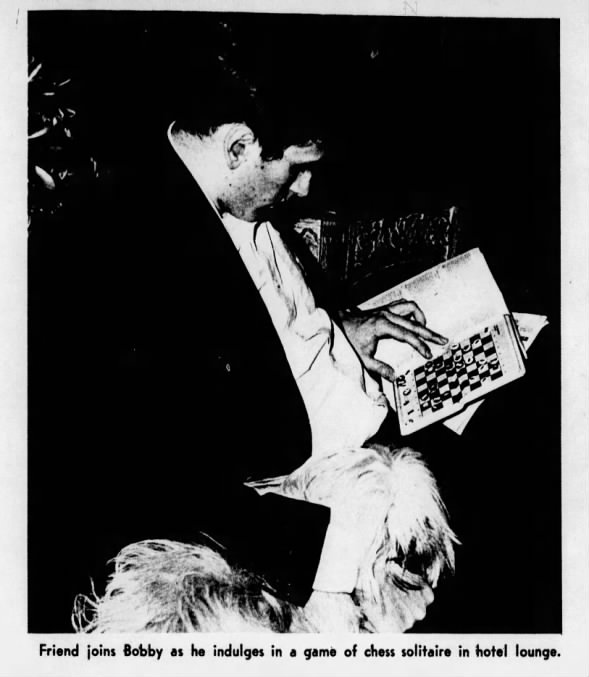 Friend Joins Bobby as He Indulges in a game of Chess Solitaire in Hotel Lounge Sat, May 20, 1972 – Page 81 · The Indianapolis Star (Indianapolis, Indiana) · Newspapers.com
Friend Joins Bobby as He Indulges in a game of Chess Solitaire in Hotel Lounge Sat, May 20, 1972 – Page 81 · The Indianapolis Star (Indianapolis, Indiana) · Newspapers.com
Friend joins Bobby as he indulges in a game of chess solitaire in hotel lounge.
 The King and His Sixty-Four Squares Sat, May 20, 1972 – Page 80 · The Indianapolis Star (Indianapolis, Indiana) · Newspapers.com
The King and His Sixty-Four Squares Sat, May 20, 1972 – Page 80 · The Indianapolis Star (Indianapolis, Indiana) · Newspapers.com
 The King and His Sixty-Four Squares Sat, May 20, 1972 – Page 80 · The Indianapolis Star (Indianapolis, Indiana) · Newspapers.com
The King and His Sixty-Four Squares Sat, May 20, 1972 – Page 80 · The Indianapolis Star (Indianapolis, Indiana) · Newspapers.com
Whatever Joe Namath is to football or Muhammad Ali to boxing, it all goes double for Bobby Fischer and chess. The lone idol of America's 3 million chess buffs, a player so good he's in a class by himself, Bobby Fischer is a walking example of what it means to have your life completely dominated by trying to corner a wooden king on a checkered board.
At 29, he is on the verge of achieving his ambition to play directly—head to head—for the elusive world's championship of chess, ([Soviet chess officials and their widespread influence over worldwide chess, including its long arm over media narratives]) has thrown up roadblocks which threaten to derail all the delicate international arrangements for staging the match.
In a hotel room at Grossinger's Catskill resort, where he's been training for the chess bout, Fischer interrupts his concentration on the chess strategy of the man he hopes to dethrone as world champ — the Russian, Boris Spassky.
He doesn't trust the Soviets (for good reason); he's dissatisfied with the money arrangements (maybe good reason). Due to Fischer's request for a percentage of the gate sales, the Belgrade officials illegally demanded a 35k guarantee, a demand rejected by Edmondson of the US Chess Federation, the Soviet and their sympathetic supporter-base worldwide made such an issue, including without cause, Belgrade organizers withdrawing its agreement to host the match, that it jeopardized the playoff.
It is difficult to appreciate that Bobby's burning ambition, even before he became the youngest chess grandmaster in history (at 15), has been to beat the Russians at their own best game. It's also difficult for most Americans to understand the emotional value, the national prestige, that the Russians place on holding the chess crown. Bobby Fischer knows. He also knows what lengths they'll go to to hold onto it.
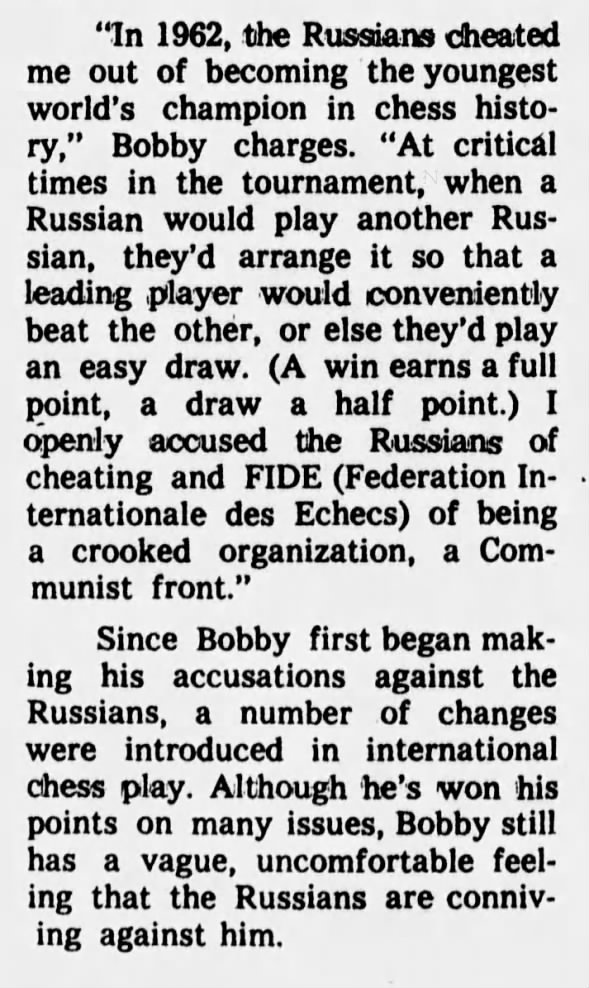 The King and His Sixty-Four Squares Sat, May 20, 1972 – Page 80 · The Indianapolis Star (Indianapolis, Indiana) · Newspapers.com
The King and His Sixty-Four Squares Sat, May 20, 1972 – Page 80 · The Indianapolis Star (Indianapolis, Indiana) · Newspapers.com
“In 1962, the Russians cheated me out of becoming the youngest world's champion in chess history,” Bobby charges. “At critical times in the tournament, when a Russian would play another Russian, they'd arrange it so that a leading player would conveniently beat the other, or else they'd play an easy draw. (A win earns a full point, a draw a half point.) I openly accused the Russians of cheating and FIDE (Federation Internationale des Echecs) of being a crooked organization, a Communist front.”
Since Bobby first began making his accusations against the Russians, a number of changes were introduced in international chess play. Although he's won his points on many issues, Bobby still has a vague, uncomfortable feeling that the Russians are conniving against him. [(Fischer's charges over what was already known as “Grandmaster Draws” were neither original nor unique, the same issues having long since, been raised by official figures such as Ed Lasker back in 1950 and a common topic among chess columnists, enthusiasts and news reports long before Fischer's entry into the major league. The Soviets were most definitely conniving against Fischer, because Fischer was a rising star and brought this already well known establishment corruption into the public eye through use of major media outlets. Before that time, the subject was confined within the chess community, and the Soviet reasoned, if they ignored their critics, they would simply go away.])
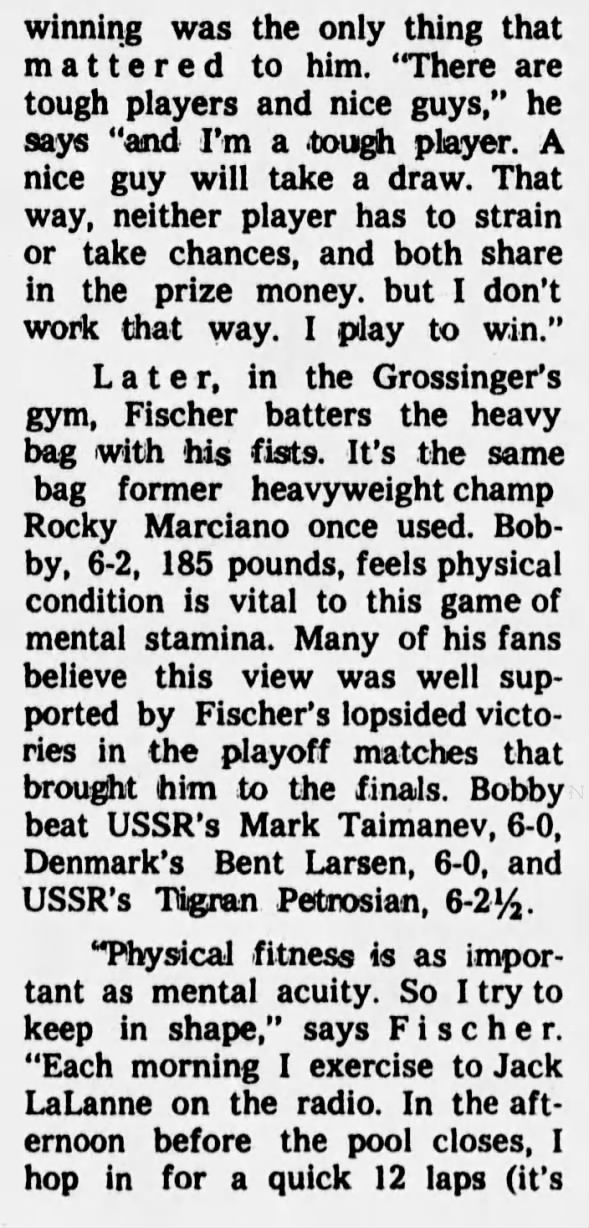 The King and His Sixty-Four Squares Sat, May 20, 1972 – Page 80 · The Indianapolis Star (Indianapolis, Indiana) · Newspapers.com
The King and His Sixty-Four Squares Sat, May 20, 1972 – Page 80 · The Indianapolis Star (Indianapolis, Indiana) · Newspapers.com
Bobby let it be known winning was the only thing that mattered to him. “There are tough players and nice guys,” he says “and I'm a tough player. A nice guy will take a draw. That way, neither player has to strain or take chances, and both share in the prize money, but I don't work that way. I play to win.”
Later in the Grossinger's gym, Fischer batters the heavy bag with his fists. It's the same bag former heavyweight champ Rocky Marciano once used. Bobby, 6-2, 185 pounds, feels physical condition is vital to this game of mental stamina. Many of his fans believe this view was well supported by Fischer's lopsided victories in the playoff matches that brought him to the finals. Bobby beat USSR's Mark Taimanov, 6-0, Denmark's Bent Larsen, 6-0, and USSR's Tigran Petrosian, 6-2½.
“Physical fitness is as important as mental acuity. So I try to keep in shape,” says Fischer. “Each morning I exercise to Jack LaLanne on the radio. In the afternoon before the pool closes, I hop in for a quick 12 laps (it's not crowded then). Also I manage to get in a good steam bath.
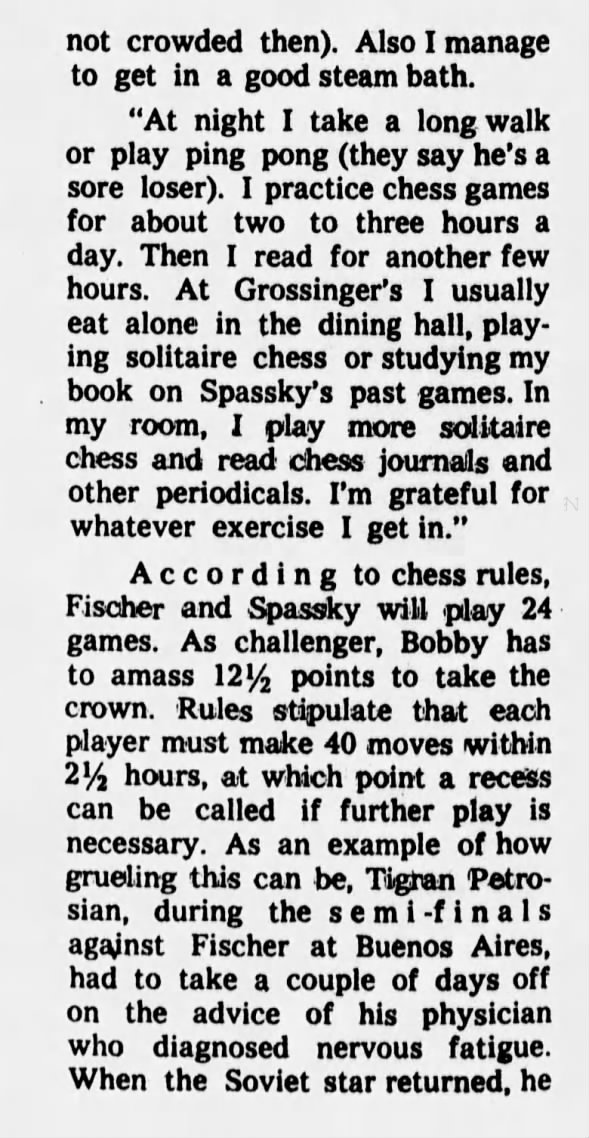 The King and His Sixty-Four Squares Sat, May 20, 1972 – Page 80 · The Indianapolis Star (Indianapolis, Indiana) · Newspapers.com
The King and His Sixty-Four Squares Sat, May 20, 1972 – Page 80 · The Indianapolis Star (Indianapolis, Indiana) · Newspapers.com
“At night I take a long walk or play ping pong. I practice chess games for about two to three hours a day. Then I read for another few hours. At Grossinger's I usually eat alone in the dining hall, playing solitaire chess or studying my book on Spassky's past games. In my room, I play more solitaire chess and read chess journals and other periodicals. I'm grateful for whatever exercise I get in.”
According to chess rules, Fischer and Spassky will play 24 games. As challenger, Bobby has to amass 12½ points to take the crown. Rules stipulate that each player must make 40 moves within 2½ hours, at which point a recess can be called if further play is necessary. As an example of how grueling this can be, Tigran Petrosian, during the semi-finals against Fischer at Buenos Aires, had to take a couple of days off on the advice of his physician who diagnosed nervous fatigue.
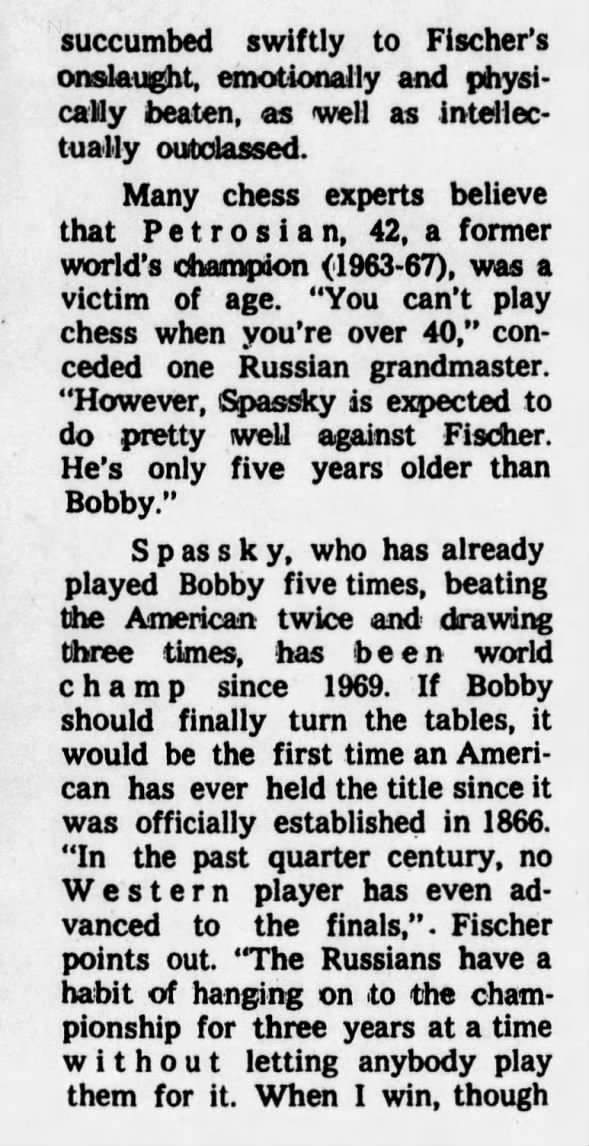 The King and His Sixty-Four Squares Sat, May 20, 1972 – Page 81 · The Indianapolis Star (Indianapolis, Indiana) · Newspapers.com
The King and His Sixty-Four Squares Sat, May 20, 1972 – Page 81 · The Indianapolis Star (Indianapolis, Indiana) · Newspapers.com
When the Soviet star returned, he succumbed swiftly to Fischer's onslaught, emotionally and physically beaten, as well as intellectually outclassed.
Many chess experts believe that Petrosian, 42, a former world champion (1963-67), was a victim of age. “You can't play chess when you're over 40,” conceded one Russian grandmaster. “However, Spassky is expected to do pretty well against Fischer. He's only five years older than Bobby.”
Spassky, who has already played Bobby five times, beating the American twice and drawing three times, has been world champ since 1969. If Bobby should finally turn the tables, it would be the first time an American has ever held the title since it was officially established in 1866. “In the past quarter century, no Western player has even advanced to the finals,” Fischer points out. “The Russians have a habit of hanging on to the championship for three years at a time without letting anybody play them for it. When I win, though I'll put my title on the line every year, maybe even twice. I'll give other players a chance to beat me.” ([and Fischer did just that, true to his word. He offered Spassky the opportunity for a rematch but the Soviet forbid Spassky to travel. (from 1985)])
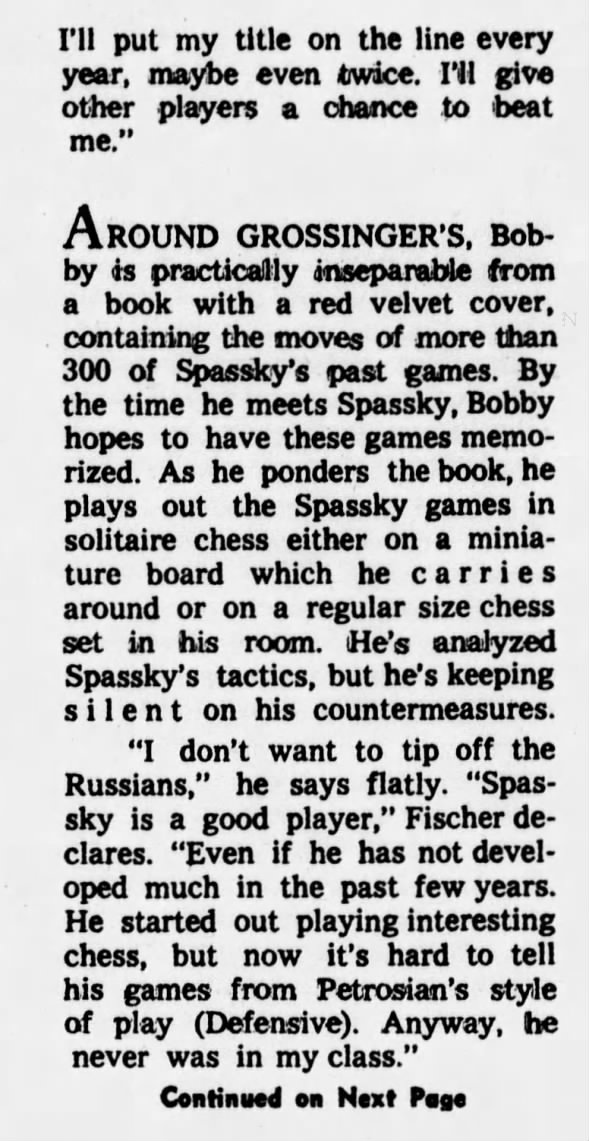 The King and His Sixty-Four Squares Sat, May 20, 1972 – Page 81 · The Indianapolis Star (Indianapolis, Indiana) · Newspapers.com
The King and His Sixty-Four Squares Sat, May 20, 1972 – Page 81 · The Indianapolis Star (Indianapolis, Indiana) · Newspapers.com
Around Grossinger's, Bobby is practically inseparable from a book with a red velvet cover, containing the moves of more than 300 of Spassky's past games. By the time he meets Spassky, Bobby hopes to have these games memorized. As he ponders the book, he plays out the Spassky games in solitaire chess which he carries around or on a regular size chess set in his room. He's analyzed Spassky's tactics, but he's keeping silent on his countermeasures.
“I don't want to tip off the Russians,” he says flatly. “Spassky is a good player,” Fischer declares. “Even if he has not developed much in the past few years. He started out playing interesting chess, but now it's hard to tell his games from Petrosian's style of play (Defensive). Anyway, he never was in my class.”
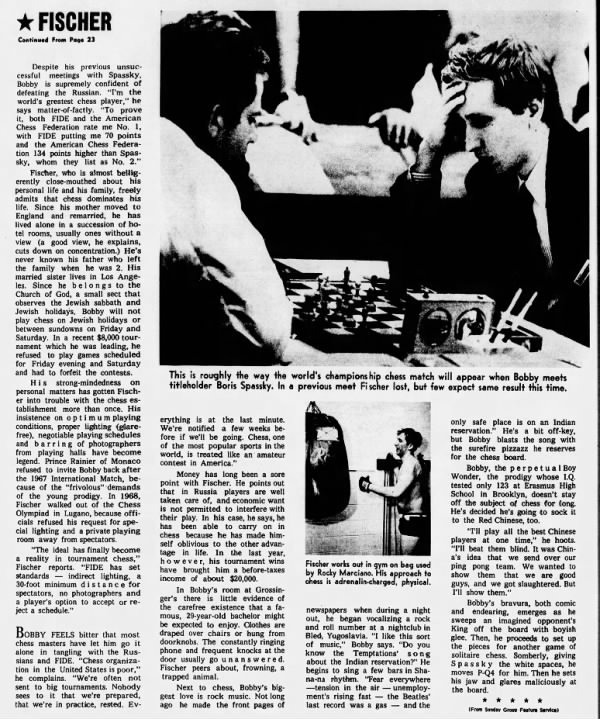 Defamatory Soviet Propaganda Sat, May 20, 1972 – Page 82 · The Indianapolis Star (Indianapolis, Indiana) · Newspapers.com
Defamatory Soviet Propaganda Sat, May 20, 1972 – Page 82 · The Indianapolis Star (Indianapolis, Indiana) · Newspapers.com
Despite his previous unsuccessful meetings with Spassky, Bobby is supremely confident of defeating the Russian. “I'm the world's greatest chess player,” he says matter-of-factly. “To prove it, both FIDE and the American Chess Federation rate me No. 1, with FIDE putting me 70 points and the American Chess Federation 134 points higher than Spassky, whom they list as No. 2.”
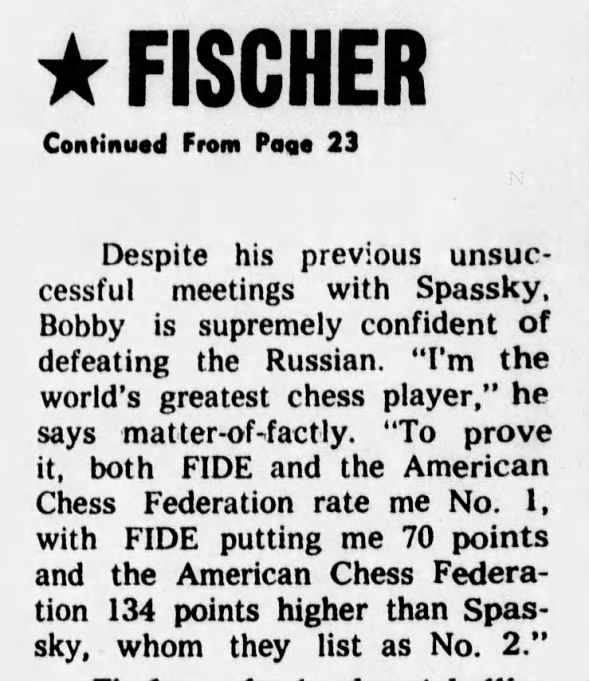 The King and His Sixty-Four Squares Sat, May 20, 1972 – Page 82 · The Indianapolis Star (Indianapolis, Indiana) · Newspapers.com
The King and His Sixty-Four Squares Sat, May 20, 1972 – Page 82 · The Indianapolis Star (Indianapolis, Indiana) · Newspapers.com
Fischer, who is closed-mouthed about his personal life and his family, freely admits that chess dominates his life. Since his mother moved to England and remarried, he has lived alone in a succession of hotel rooms, usually ones without a view (a good view, he explains, cuts down on concentration.) His married sister lives in Los Angeles. Since he belongs to the Worldwide Church of God, a large sect which boasts over two million followers, that observes the seventh day Sabbath, like Jews and Seventh Day Adventists and keeps some of the same holy days as the Old Testament Hebrews, Bobby will not play chess on the WCG's holy days or between sundowns on Friday and Saturday. In a recent $8,000 tournament which he was leading, he refused to play games scheduled for Friday evening and Saturday, and had to forfeit the contests ([due to antisemitic discrimination of organizers in Tunisia.)].
His strong-mindedness on personal matters ([and a threat of getting into trouble with church officials, for instance, found guilty of working on the Sabbath, in public press, they would be excommunicated from the church)] has gotten Fischer into trouble with the chess establishment more than once. His insistence on optimum playing conditions, proper lighting (glare-free), negotiable playing scheduled and barring of photographers from playing halls have become legend.
“The ideal has finally become a reality in tournament chess,” Fischer reports. “FIDE has set standards — indirect lighting, a 30-foot minimum distance for spectators, no photographers and a player's option to accept or reject a schedule.”
 The King and His Sixty-Four Squares Sat, May 20, 1972 – Page 82 · The Indianapolis Star (Indianapolis, Indiana) · Newspapers.com
The King and His Sixty-Four Squares Sat, May 20, 1972 – Page 82 · The Indianapolis Star (Indianapolis, Indiana) · Newspapers.com
Bobby feels bitter that most chess masters have let him go it alone in tangling with the Russians and FIDE. “Chess organization in the United States is poor,” he complains. “We're often not sent to big tournaments. Nobody sees to it that we're prepared, that we're in practice, rested. Everything is at the last minute.
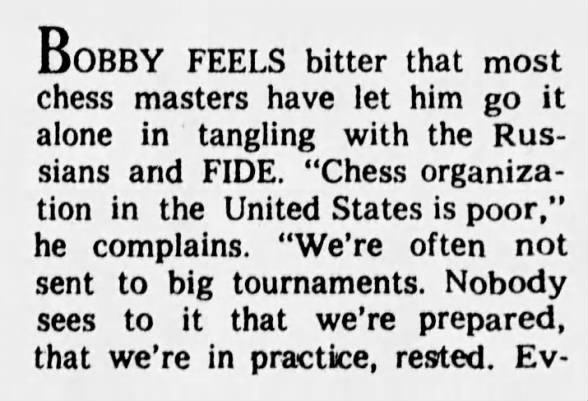 The King and His Sixty-Four Squares Sat, May 20, 1972 – Page 82 · The Indianapolis Star (Indianapolis, Indiana) · Newspapers.com
The King and His Sixty-Four Squares Sat, May 20, 1972 – Page 82 · The Indianapolis Star (Indianapolis, Indiana) · Newspapers.com
We're notified a few weeks before if we'll be going. Chess, one of the most popular sports in the world, is treated like an amateur contest in America.
Money has long been a sore point with Fischer. He points out that in Russia players are well taken care of, and economic want is not permitted to interfere with their play. In his case, he says he has been able to carry on in chess because he has made himself oblivious to the other advantage in life. In the last year, however, his tournament wins have brought him a before-taxes income of about $20,000.
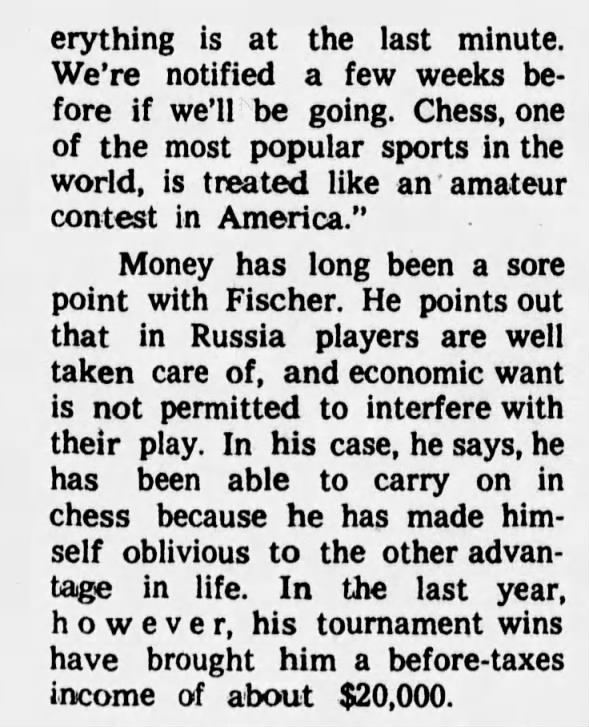 The King and His Sixty-Four Squares Sat, May 20, 1972 – Page 82 · The Indianapolis Star (Indianapolis, Indiana) · Newspapers.com
The King and His Sixty-Four Squares Sat, May 20, 1972 – Page 82 · The Indianapolis Star (Indianapolis, Indiana) · Newspapers.com
Next to chess, Bobby's biggest love is [Soul & Rhythm and Blues genre] music.
 The King and His Sixty-Four Squares Sat, May 20, 1972 – Page 82 · The Indianapolis Star (Indianapolis, Indiana) · Newspapers.com
The King and His Sixty-Four Squares Sat, May 20, 1972 – Page 82 · The Indianapolis Star (Indianapolis, Indiana) · Newspapers.com
Not long ago he made the front pages of newspapers when during a night out, he began vocalizing a Soul (RandB) number at a nightclub in Bled, Yugoslavia. “I like this sort of music,” Bobby says. “Do you know the Temptations' song about the Indian reservation?” He begins to sing a few bars in Sha-na-na rhythm. “Fear everywhere—tension in the air—unemployment's rising fast—the Beatles' last record was a gas— and the only place is on an Indian reservation.” He's a bit off key, but Bobby blasts the song with the surefire pizzazz he reserves for the chess board.
Bobby, the perpetual Boy Wonder, the prodigy whose I.Q. tested only 123 at Erasmus High School in Brooklyn, doesn't stay off the subject of chess for long. ([Shevey doesn't mention the source of her peculiarly arbitrary number, when even Bobby himself does not know the score and confirms he does not enjoy discussing this topic, although 123 itself would fit neatly in the “generally superior intelligence” range, she does not clarify her source. In the words of Stephen Hawking who was asked about his IQ, he replied: “I have no idea. People who boast about their IQ are losers.”)] He's decided he's going to sock it to the Red Chinese, too.
“I'll play all the best Chinese players at one time,” he hoots. “I'll beat them blind. It was China's idea that we send over our ping pong team. We wanted to show them that we are good guys, and we got slaughtered. But I'll show them.”
Bobby's bravura, both comic and endearing, emerges as he sweeps an imagined opponent's King off the board with boyish glee. Then, he proceeds to set up the pieces for another game of solitaire chess. Somberly, giving Spassky the white spaces, he moves P-Q4 for him. Then he sets his jaw and glares maliciously at the board.
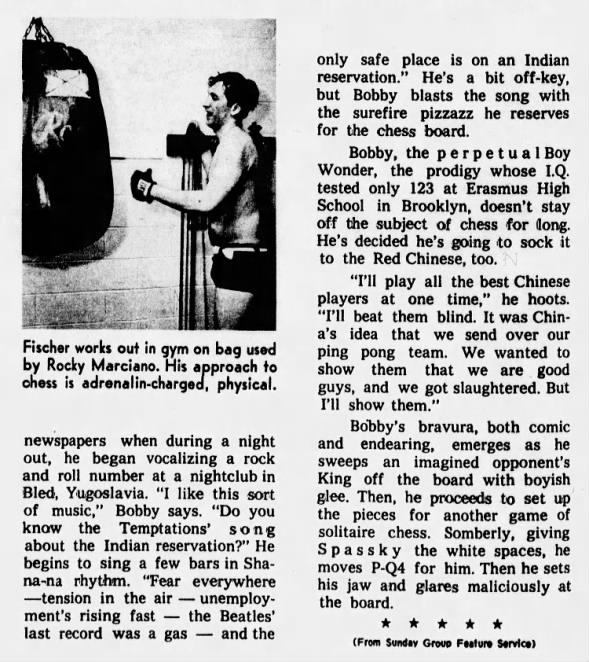 The King and His Sixty-Four Squares Sat, May 20, 1972 – Page 82 · The Indianapolis Star (Indianapolis, Indiana) · Newspapers.com
The King and His Sixty-Four Squares Sat, May 20, 1972 – Page 82 · The Indianapolis Star (Indianapolis, Indiana) · Newspapers.com
The Indianapolis News Indianapolis, Indiana Monday, May 22, 1972 - Page 21
Kup's Column : His Kingdom For A Knight's Queen
Chicago — Impresario Frank Fried will win the hearts of the nation's chess enthusiasts with this project: He's on the verge of a deal for a closed-circuit audio (not visual) broadcast of the world chess championship in Iceland between America's Bobby Fischer and Russia's Boris Spassky. As Fried envisions it, huge chess boards will be installed in hotel ballrooms in key cities and each move by Fischer and Spassky will be charted as the closed-circuit reports come in …
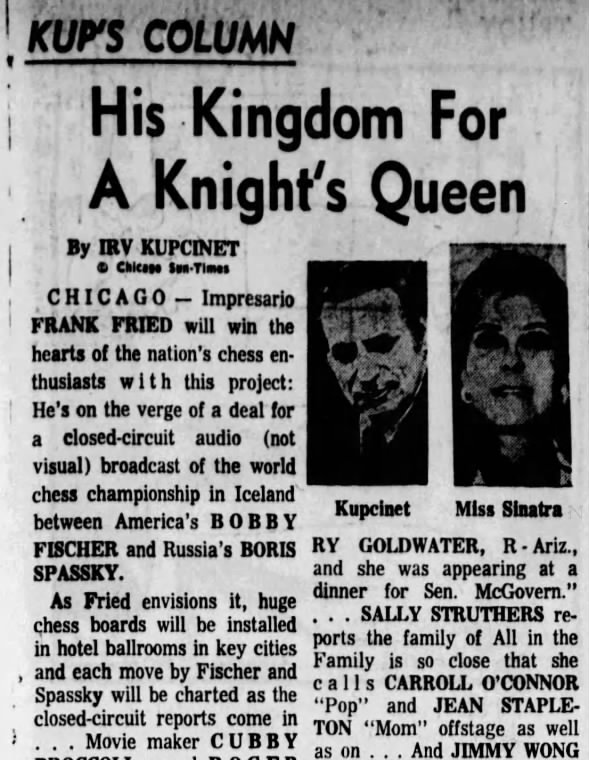 Kup's Column : His Kingdom For A Knight's Queen Mon, May 22, 1972 – 21 · The Indianapolis News (Indianapolis, Indiana) · Newspapers.com
Kup's Column : His Kingdom For A Knight's Queen Mon, May 22, 1972 – 21 · The Indianapolis News (Indianapolis, Indiana) · Newspapers.com
New York Times, New York, New York, Sunday, May 21, 1972 - Page 336
New Body Twist: Eggheads Tone the Muscles, Athletes the Mind by Alan Truscott
Whether a brilliant body can function effectively when harnessed to a dull mind is a question provoked by some recent evidence suggesting that a brilliant mind can be handicapped by a dull body. If a chess champion or a bridge expert needs to keep physically fit, perhaps a sports star benefits by being mentally agile.
By a small coincidence, United States stars of the chessboard and the bridge-table are in physical training this month in preparation for world championship contests later in the summer.
Brooklyn-bred Robert Fischer, an undisputed genius, is in Grossinger, N.Y., preparing for the chess battle of the century—his world championship match against the Russian titleholder, Boris Spassky. After months of international dispute with the International Chess Federation in the middle, this is now expected to start in Reykjavik, Iceland, on July 2.
Calisthenics Beside the Tube
Fischer believes firmly that physical fitness is a vital element in his preparations, and he adopts a regimen reminiscent of a boxer working up for a major bout. Each morning he does calisthenics in front of his television set. Later in the day he is likely to swim, play tennis and bowl.
Fischer's chess successes in recent years have been phenomenal, and no doubt owe something to his fitness. The reigning world bridge champions, on the other hand, have been intermittently faithful to the idea that physical training is important, and this has been reflected in their results.
The Aces are a professional team—the only one in the world—sponsored by the financier, Ira Corn Jr. of Dallas: Jim Jacoby, Robert Wolff, Bob Goldman, Mike Lawrence and Bob Hamman, with Paul Soloway, who has recently replaced Bill Eisenberg. For two years they trained seriously in Dallas, with a program that included not only bridge but also jogging and table tennis, and won a string of victories which included two world titles in 1970 and 1971.
Last year, three members of the team moved from Dallas to Los Angeles and the training program was abandoned. Since then their results have been disastrous—no victories, and a much-heralded defeat in a high-stake match in Las Vegas against the Italian Blue Team, which monopolized the world title until it retired in 1969.
Next month the Aces should clash again with the Blue Team in Miami Beach, Fla. If they survive the 40-team qualifying round robin in the World Team Olympiad they are likely to meet in the semifinal or the final, when stamina will be an important factor.
Also competing in the Olympiad as a member of the United States women's team is bridge's best-selling author, Dorothy Hayden of Riverdale, N.Y., who heads all American women experts in the world rankings. She is almost the only one among them who believes in the importance of physical fitness in coping with the strains and tensions of tournament play. This month she is seizing every opportunity to play tennis, or exercise at the newly opened Spa Health Club, 505 Park Avenue.
[…]
It is not necessary, of course, for mental-cum-physical training to be a matter of conscious planning. Fischer's opponent, Boris Spassky, is exceptionally fond of sport for its own sake, and like his American rival plays tennis, swims and does gymnastics. Whether they will choose to play tennis against each other on their free days while in Iceland remains to be seen, but they will surely be the fittest-ever pair of world chess champion contenders. …
The Miami News Miami, Florida Wednesday, May 24, 1972 - Page 34
Playing It Close To The Chess
Carner Bank first vice president Abel Holtz, right, takes a giant chess step forward as opponent Stephen Carner, the bank president, left, and Miami Beach Chess Club president Norman Mendelson look on. The bank is sponsoring a U.S. Chess Federation tournament May 26-28 at the chess club, 2000 Washington Ave. The winner will get a free trip to Iceland this summer to see the world championship match between American Bobby Fischer and world champion Boris Spassky of the Soviet Union.
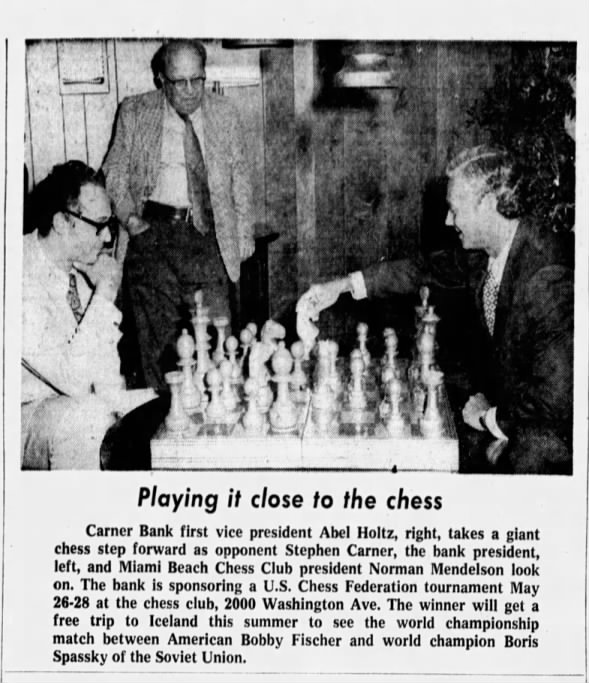 Playing It Close To The Chess Wed, May 24, 1972 – 34 · The Miami News (Miami, Florida) · Newspapers.com
Playing It Close To The Chess Wed, May 24, 1972 – 34 · The Miami News (Miami, Florida) · Newspapers.com
The Boston Globe Boston, Massachusetts Thursday, May 25, 1972 - Page 62
Tourney Broadcast
Chess addicts can rejoice. It looks as if the world championship match at Reykjavik, Iceland, between Bobby Fischer, the young American star, and Boris Spassky, the Russian champion, will be carried live — at least in re-creation — on Station WGBH-TV (Channel 2) and other stations of the Eastern Educational Network (EEN).
There will be no television in the room of the actual contest, but Channel 2 hopes to have the moves relayed as they occur and will show them on a large board, with full analysis and comment by the New England champion.
Some details remain to be determined, so broadcast dates and times cannot be announced yet. But it appears as if the contests will have to be carried in the afternoon hours here, due to the time differential.
With five hours of competition expected daily, the station plans to devote three hours live to the match, from 1 to 4, with frequent updates on the action during the children's period from 4 to 6.
The championship tourney is due to start July 2. It will last eight weeks, at the rate of three games a week.
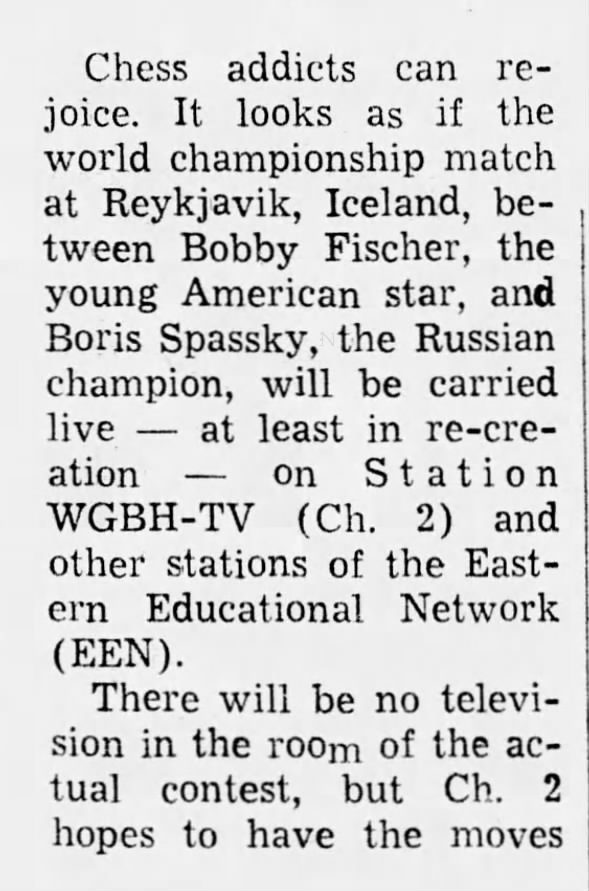 Tourney Broadcast Thu, May 25, 1972 – 62 · The Boston Globe (Boston, Massachusetts) · Newspapers.com
Tourney Broadcast Thu, May 25, 1972 – 62 · The Boston Globe (Boston, Massachusetts) · Newspapers.com
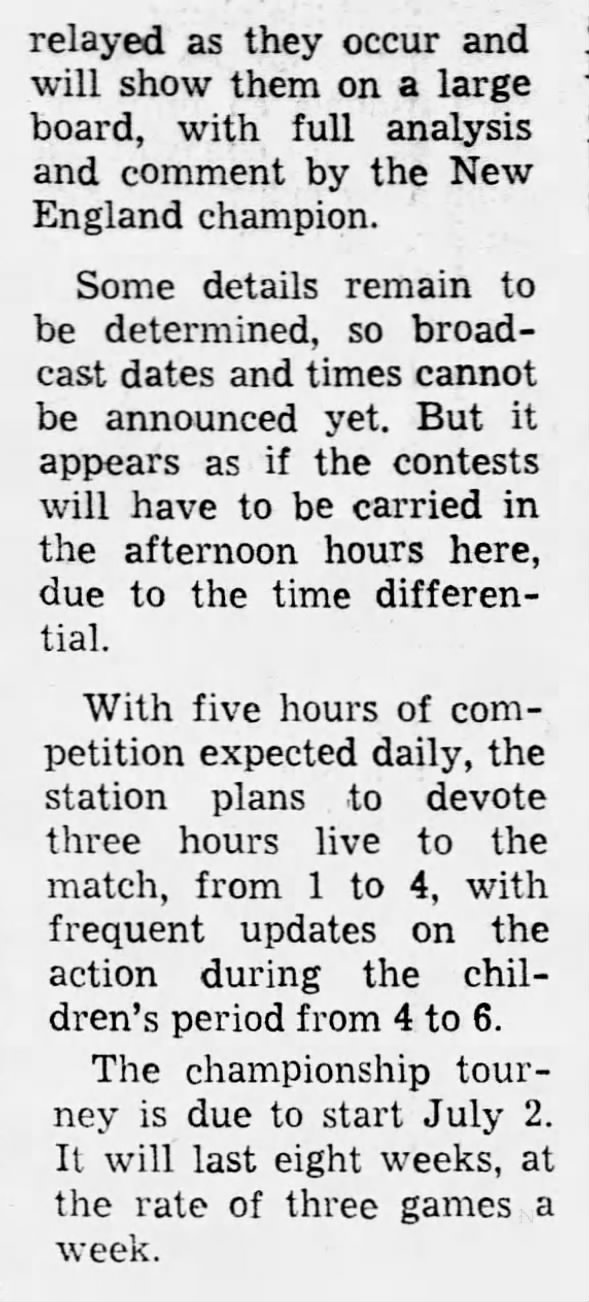 Tourney Broadcast Thu, May 25, 1972 – 62 · The Boston Globe (Boston, Massachusetts) · Newspapers.com
Tourney Broadcast Thu, May 25, 1972 – 62 · The Boston Globe (Boston, Massachusetts) · Newspapers.com
Lincoln Journal Star Lincoln, Nebraska Sunday, May 28, 1972 - Page 13
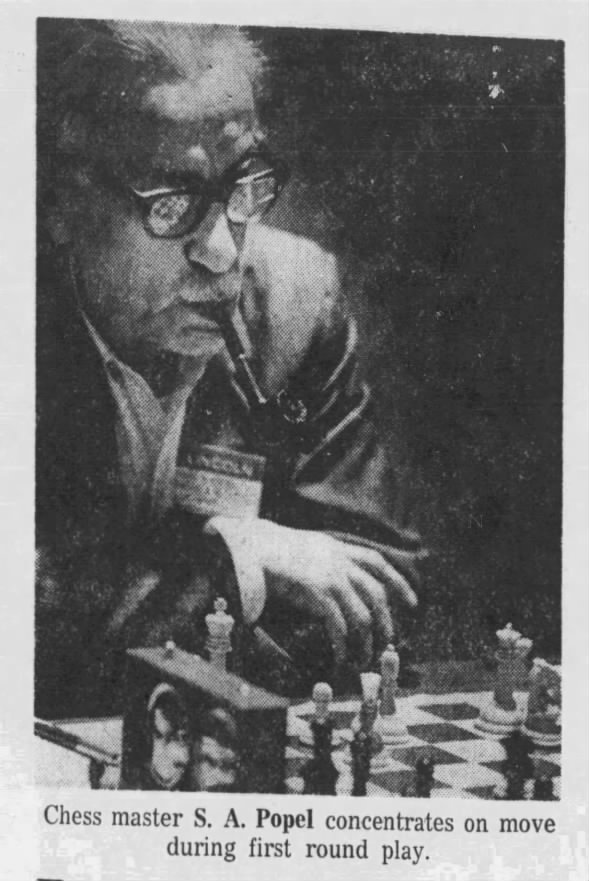 Restrained Sport of Chess Really Nerve-Wracking Game of 'Action' Sun, May 28, 1972 – 13 · Lincoln Journal Star (Lincoln, Nebraska) · Newspapers.com
Restrained Sport of Chess Really Nerve-Wracking Game of 'Action' Sun, May 28, 1972 – 13 · Lincoln Journal Star (Lincoln, Nebraska) · Newspapers.com
Chess master S.A. Popel concentrates on move during first round play.
 Restrained Sport of Chess Really Nerve-Wracking Game of 'Action' Sun, May 28, 1972 – 13 · Lincoln Journal Star (Lincoln, Nebraska) · Newspapers.com
Restrained Sport of Chess Really Nerve-Wracking Game of 'Action' Sun, May 28, 1972 – 13 · Lincoln Journal Star (Lincoln, Nebraska) · Newspapers.com
Restrained Sport of Chess Really Nerve-Wracking Game of 'Action' by Sue Story
 Restrained Sport of Chess Really Nerve-Wracking Game of 'Action' Sun, May 28, 1972 – 13 · Lincoln Journal Star (Lincoln, Nebraska) · Newspapers.com
Restrained Sport of Chess Really Nerve-Wracking Game of 'Action' Sun, May 28, 1972 – 13 · Lincoln Journal Star (Lincoln, Nebraska) · Newspapers.com
In a smoke-filled room at the Ramada Inn Saturday afternoon, 45 men and one woman sat deep in concentration.
The near silence was broken by clocks ticking, pens scratching, clock buttons popping and people rising to walk.
This was the quiet sport of chess in action — the American Chess Organizers Invitational and Jerry Spann Memorial Tournament.
The national contest continues through Monday. It was designed as a memorial to the late Jerry Spann, a man known as the heart and soul of American chess.
At the registration desk were indigestion pills, cough drops, cold tablets and paper tissues. Another table held coffee, tea and water.
Chess is a demanding game that frequently brings on conditions needing the above remedies.
The tournament is played Swiss style. This means players have limited time to complete the game. Two and one-half hours are allowed to make 50 moves.
Entrants are Nebraska players and invited national players.
Among the notables present are S.A. Popel, a chess master; Fred Cramer, past president of the United States Chess Foundation; Aleksander Liepnieks, Lincoln Chess Foundation president and Arpad Elo, creator of the Elo rating system.
This system is used internationally to determine the rank of a chess player compared to another.
Elo said that by his ratings U.S. Champion Bobby Fischer is a better player than current world champion Boris Spassky.
Should the two meet, as presently scheduled, Elo said he favors Fischer by odds of five to three.
Few take the game as seriously as Fischer, but Saturday players looked intent.
There were grimaced faced, white knuckles, folded hands and nervous twitches. Some games were played rapidly with rooks, pawns and knights removed from the board quickly.
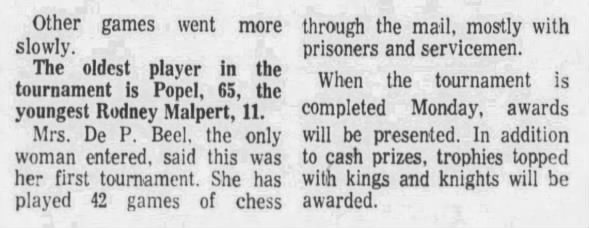 Restrained Sport of Chess Really Nerve-Wracking Game of 'Action' Sun, May 28, 1972 – 13 · Lincoln Journal Star (Lincoln, Nebraska) · Newspapers.com
Restrained Sport of Chess Really Nerve-Wracking Game of 'Action' Sun, May 28, 1972 – 13 · Lincoln Journal Star (Lincoln, Nebraska) · Newspapers.com
Other games went more slowly.
The oldest player in the tournament is Popel, 65, the youngest Rodney Malpert, 11.
Mrs. De P. Beel, the only woman entered, said this was her first tournament. She has played 42 games of chess through the mail, mostly with prisoners and servicemen.
When the tournament is completed Monday, awards will be presented. In addition to cash prizes, trophies topped with kings and knights will be awarded.
The Des Moines Register Des Moines, Iowa Tuesday, May 30, 1972 - Page 6
Thinks Chess Rates More Attention
To the Editor: I am very pleased to see that your paper has given a continual flow of information on the upcoming Fischer-Spassky world championship chess match. I was also glad to see your announcement of the Iowa State Championship …
It's galling to see an American competing for the world championship with scarcely a word of news in most papers. I realize that chess has to fight for space against other sports and hobbies. However, there are a vast number of people who know the moves and would be attracted to organized chess if they only knew it existed. More people play chess than bridge, yet most papers carry a daily bridge column. This state of affairs is intolerable. …
There is no way to describe the joy of a chess player who has executed a brilliant “combination,” or has accurately learned an end-game technique.
—Bob Beelman, treasurer, Ford Madison Chess Club, Fort Madison, Iowa, 52627.
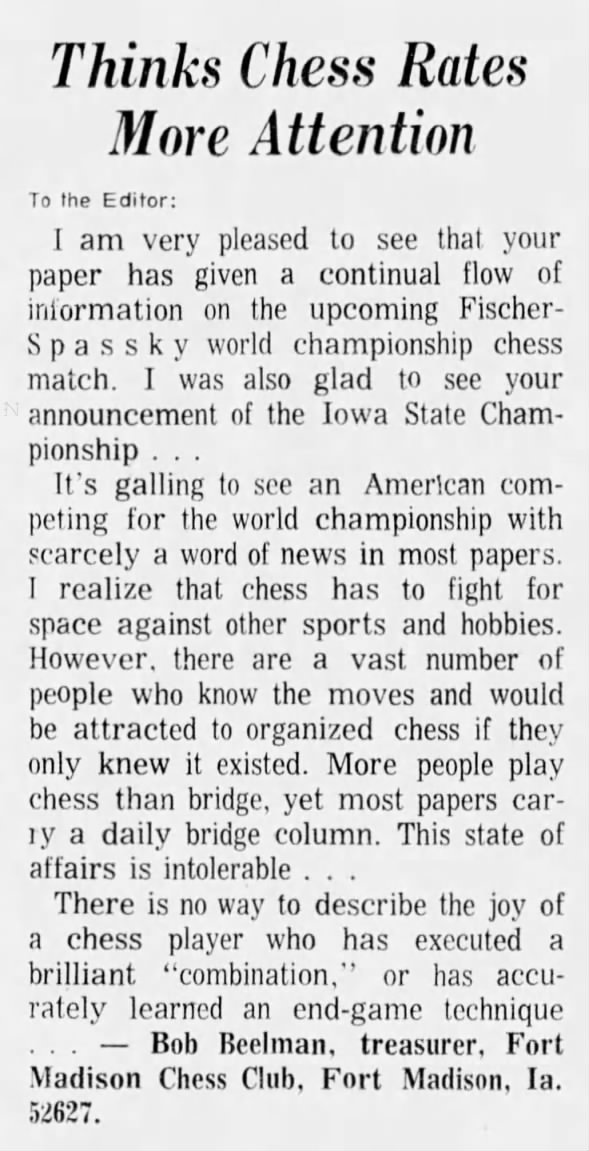 Thinks Chess Rates More Attention Tue, May 30, 1972 – 6 · The Des Moines Register (Des Moines, Iowa) · Newspapers.com
Thinks Chess Rates More Attention Tue, May 30, 1972 – 6 · The Des Moines Register (Des Moines, Iowa) · Newspapers.com
















